Sept 2015
Sept 2015 JoyNew school for Mpumalanga community
New school for Mpumalanga community JoyThe Makause Combined School, situated in Phola in Mpumalanga, has brought hope to the community by ensuring access to education.
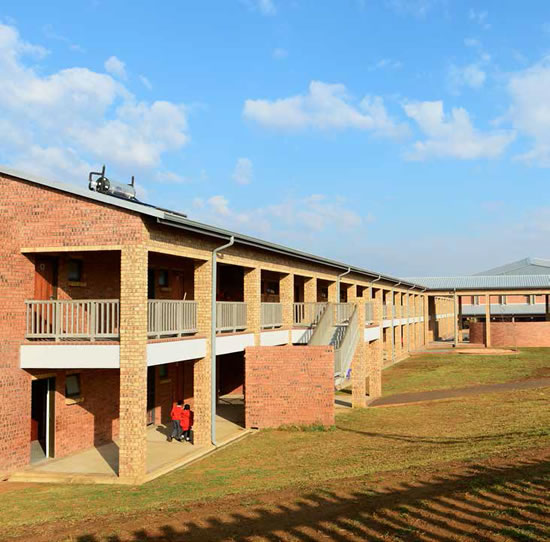 The R74 million state-of-the-art school became a reality due to a partnership between the Department of Basic Education and mining company Glencore.
The R74 million state-of-the-art school became a reality due to a partnership between the Department of Basic Education and mining company Glencore.
The school was part of a major relocation project in which Glencore relocated 120 families from rural Tweefontein to Phola, as part of its Tweefontein Optimisation Project.
The project represents a R8 billion investment by Glencore, with 780 full-time employees, that produces eight million tonnes of saleable coal per year. During construction, the project created over 2 600 jobs and a number of business opportunities for local entrepreneurs through local procurement.
The project also includes a housing development, completed at an additional cost of R70 million, that will accommodate around 120 relocated families.
Restoring hope
The school, which is situated in the middle of the housing development, caters for pre-primary, primary and secondary grades. It has 32 classrooms, science laboratories, home economics facility, wood and metal workshops, library, computer centre and a hall that accommodates 1 200 pupils.
Amos Shali Mahlangu has been the principal of Makause for 32 years and has seen it evolve over the years.
“Prior to being relocated, we were situated in Tweefontien which was a farming and mining community. This meant that children needed to travel over 40 kilometres to get to school, using transport provided by the Department of Basic Education.”
Since the building of the school and the housing development children now walk less than one kilometre to get to school.
“One of the main problems at the old school was absenteeism and parents did not attend school meetings due to the distance they had to travel. Since the relocation, there is a decline in absenteeism and more parents are attending meetings,” said Mahlangu.
Phillip Maimela, chairperson of the school governing body, has two children that are learners at the school. He said he was happy with the new facility and that his children received proper education.
Minister of Basic Education Angie Motshekga, who attended the opening of the school, said it would go a long way towards changing the lives of these learners.
“An investment in education of this
magnitude demonstrates the commitment of Glencore to the future of the country. It is only when we come together as government, business, civil society and ordinary citizens that we can we truly break the barriers of inequality.
“For children to excel, they need a conducive and inspiring environment and this school will be a beacon of hope for the entire community,” said Minister Motshekga.
She said she was confident that the school would produce the innovators needed to take South Africa to the next level and fuel economic development.
Glencore SA Coal CEO, Clinton Ephron, said: “We are proud to handover this school to the Department of Basic Education. The Makause School is a demonstration of our commitment to South Africa and the local communities where we operate.”
“A good education helps to provide a strong foundation for children to achieve their potential,” he added.
Jobs, houses and health for mining towns
Jobs, houses and health for mining towns JoyGovernment has allocated R18 billion to improve the living conditions of distressed mining communities across the country.
Headed by the Inter-Ministerial Committee (IMC) in charge of revitalising mining communities, the projects include housing and wellness projects.
“Overall R18 billion has been dedicated to ongoing work in distressed mining communities, benefitting the following provinces: Eastern Cape, Free State, Gauteng, KwaZulu-Natal, Limpopo, Mpumalanga and North West,” President Jacob Zuma said recently
The President announced that the Department of Human Settlements, supported by its agencies, was implementing about 66 public sector housing projects in the 15 prioritised mining towns.
In the 2014/15 financial year, more than R419 million was spent on the ring-fenced budget for informal settlement upgrading in prioritised mining towns in Limpopo, Free State, Gauteng, Mpumalanga and North West.
About R1 billion has been ring-fenced for this financial year. This is anticipated to deliver approximately 19 000 housing opportunities in mining towns.
In addition to the ring-fenced human settlement grant funding for distressed mining towns, the Department of Human Settlements’ housing agencies have contributed over R1 billion to integrated human settlements within mining towns.
President Zuma said a number of government departments were facilitating both large and small-scale industrial projects in the 15 mining towns.
These, he said, are particularly critical in creating business and employment opportunities.
President Zuma engages students
President Zuma engages students JoyPresident Jacob Zuma got to experience first-hand students’ living conditions during a recent visit to the Tshwane University of Technology, situated north of Pretoria.
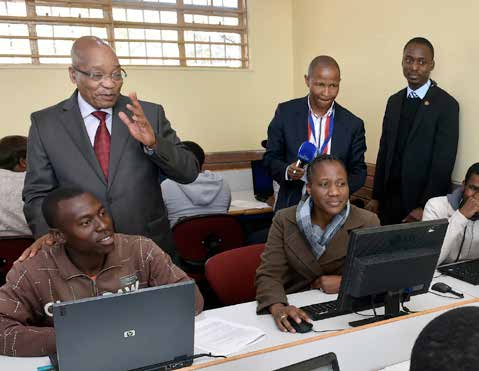 The visit formed part of government’s Siyahlola Presidential Monitoring programme and its Youth Month programme, which focused on education, skills development and job creation.
The visit formed part of government’s Siyahlola Presidential Monitoring programme and its Youth Month programme, which focused on education, skills development and job creation.
“We received complaints from students about the dilapidated state of bedrooms and bathrooms in the female residence. We also received complaints about taverns that operated at the entrance of campuses, hence it was important for us to come and personally see what is happening,” said President Zuma.
He interacted with students and toured both the male and female residences. Students expressed their discomfort about the poor living conditions and a lack of proper security.
Students also raised the challenge of funding to pay for their studies, a challenge faced by many of the country’s youth.
“We are happy that young people are hungry for education in our country in this manner and we as government need to respond to this challenge positively,” said President Zuma.
Lindokuhle Manne (18), a first year Business Communication student, said her main concern was financial aid.
“Not many students get access to the National Student Financial Aid Scheme. This affects us in a big way,” said Manne.
Bethesda Fountain Church
The President also visited Bethesda Fountain Church, which has become a sanctuary for students who cannot find accommodation or cannot afford to live on campus.
The church accommodates about 70 students. One such student is 20-year-old Nkosingiphile Sibeko.
“The church members are great people and have shown us nothing but kindness,” said Sibeko.
Youth empowerment
The President’s last stop was the Botho Socio-Psychology Centre, a youth skills development centre that has been adopted by the university.
“The centre has over the years helped many of the community’s youth to acquire certain skills and transform their lives by taking them off the streets and giving them an opportunity to better themselves,” said Centre Manager Stevens Lodi.
The centre, which offers different courses, is funded by the Department of Social Development and offers its services to youth between the ages of 18 and 35.
Comfort Mnisi (21) joined the centre early this year and has already completed a course in social life skills development and is currently doing his computer skills training.
“Before I came to Botho I had nothing to do. Now I have a purpose in life and with the skills acquired here I will be able to move forward in life,” said Mnisi.
Government intervention
Government departments and institutions have been working to respond to complaints by students in different ways. These include:
- The Department of Labour created a database that registers unemployed youth and providing job placement help through Employment Services Practitioners in the area.
- The South African Police Service introduced an internship programme for 15 students.
President Zuma urged the community to assist students by providing accommodation, saying that many are willing to pay rent if they find suitable housing.
The visit proved to be a success in many ways as key interventions and progress were observed and announced.
Building houses for a brighter future
Building houses for a brighter future JoyWhen Communications Minister Faith Muthambi visited Willow Fountain in Pietermartizburg, KwaZulu-Natal, during the Presidential Imbizo in September last year, she was touched by the plight faced by the community in the area.
She promised some family members that she would do something to help improve their lives.
Fast forward to 2015 and Minister Muthambi has kept her promise.
During the Presidential Imbizo Minister Muthambi was deployed to conduct a door-to-door service delivery campaign in the area.
Realising the devastating living standards of residents, the Minister adopted ward 14 and further identified seven families in need of houses. Most of the families were living in small, overcrowded mud houses.
“I’m happy that the municipality has committed to building houses for five families. I was able to get sponsors to finish the other two. Contractors have promised that all the houses, which will have six rooms, will be completed in two weeks. The municipality will also provide services such as electricity, water and furniture for the houses,” said the Minister.
The housing project has created 10 job opportunities.
One of the beneficiaries Mlandeli Madondo, 53, said he lived with nine people in a three-room mud house. “There is no privacy and we survived through piece jobs. We are glad that government brought back our dignity by building this house for us. I do not have enough words to thank Minister Muthambi,” said Madondo.
Another beneficiary Sanele Mathe, 19, said she could not wait for the new house to be completed.
“We are 15 people living in this two-room house and there is no privacy. I can’t wait for the new house to be completed. We are really grateful for this decent house,” she said.
Changing lives
The community no longer has to travel long distances to access the internet because this service is available right on their doorstep, thanks to the Department of Communications (DoC).
Speaking at the opening of the centre, Minister Muthambi said after visiting the area, she discovered that most young people did not go to school and they were in the streets during school hours.
The new computer centre aims to change how young people, in particular, spend their time and turn them into productive members of society.
The DoC, in partnership with Vodacom, officially opened the computer centre which boasts 21 computers with high-speed broadband internet connectivity that will help young people in the rural community to connect with the world.
Minister Muthambi said the state-of-the-art computer centre will teach people computer skills which will help them when they are looking for jobs.
“The centre will also create 20 job opportunities for young people who will work as trainers at the centre. Two of these youngsters are already getting training from Vodacom to train others. In his State of the Nation Address President Jacob Zuma said public and private partnerships are the key to service delivery, we stand here today as true witnesses of President’s words,” said Minister Muthambi.
Viwe Soga, Vodacom’s advisor of Provincial and Local Government, said the company has installed Wi-Fi at the centre and will provide it with 2GB of data every month for the next 12 months.
“This is especially exciting for us because it mirrors our commitment to ensuring that Vodacom puts the power of the internet into everyone’s hands,” said Soga.
Minister Muthambi also donated school uniforms to seven learners from destitute families. She also advised the community to safeguard the facilities given to them.
Take a Sho’t Left, experience SA
Take a Sho’t Left, experience SA Joy
Each September, we follow closely in nature’s footsteps.
After the chills and storms of winter, this is a time for nature’s renewal; colourful splashes of new blossoms appear in the veld and in our gardens; in the north of our country, dry and rocky streams and rivers await the promise of the rains of summer; in the south, the land and livestock gets some time to recover from the floods of winter rains, and we all prepare for the joys of longer days, shorter nights and the freedom of the great outdoors.
 As people, we talk of “spring cleaning”, a time when, like nature, we try to make a fresh start in our households and in our lives.
As people, we talk of “spring cleaning”, a time when, like nature, we try to make a fresh start in our households and in our lives.
And as South African patriots, September brings Heritage Month – a period in which we fly our national flag particularly high, and with extraordinary pride.
This is a time in which we celebrate our national diversity with its unusually rich blend of cultural heritage. We reach out to one another in 11 official languages; we celebrate births and marriages in our own special ways within cultural communities. We greet strangers in shops and bus stops. We greet fellow listeners on radio stations when we call in to make our points. We don’t trust our voices to make enough noise at a football match, and so we take along our vuvuzelas.
Many of these things happen only in our wonderful country, and give us a unique national character, which the month of September allows us to celebrate all-out.
We are often described as a world in one country, because we are blessed to be the guardians of more than 290 conservation parks, nearly 900 bird species and 8 000 plant species, apart from 300 mammal species.
Thanks to our own appreciation and that of the international community of our special natural and cultural assets, South Africa is also home to eight World Heritage Sites.
So, we have every right to feel proud of a country in which, in September, we are also encouraged to take a Sho’t Left and experience this richness beyond the places where we normally live or visit. Let us experience our country and celebrate our heritage in many ways.

This beautiful land is, tragically, stained with the pain and blood of people who are injured or die at the hands of anti-social elements who show no regard for human life or for the property of others.
This land is stained by people who take short cuts when they should be investing blood, sweat and tears in moving South Africa forward. And this land is stained by people who spend every waking hour finding fault, pointing out our weaknesses and failures, and failing to see the good in others or in our country.
It is the positive spirit of the majority of us that is moving our country forward and making big differences in the lives of even those who moan and complain all day. We celebrate all South Africans who spend each day looking for ways of making South Africa a better place to live in. They are a gift to this beautiful country.
If you are one of the latter, let this September be – like nature – a time of renewal, a time of playing your part to make this an even better society, a time of rolling up your sleeves to help us over the difficulties our economy faces, and a time of flying the flag as high as you can.
We wish everyone a very happy Heritage Month and Tourism Month!
Internet connection for rural communities
Internet connection for rural communities JoyWhen President Jacob Zuma delivered the State of the Nation Address in February this year, he announced that government would prioritise the rollout of broadband in eight rural district municipalities.
 The Dr Kenneth Kaunda District Municipality in the North is one of the municipalities that will soon be connected to the internet.
The Dr Kenneth Kaunda District Municipality in the North is one of the municipalities that will soon be connected to the internet.
Minister of Telecommunications and Postal Services Siyabonga Cwele visited the area as part of implementing the first phase of the rollout of broadband or fast, reliable, secure and affordable internet. The rollout of phase one is scheduled to run over three years, starting this year.
“As government, our aim is to ensure that we connect all citizens to the internet, including those who live on farms,” said the Minister.
Mayor of the Dr Kenneth Kaunda District, Councillor Boitumelo Moloi, said the municipality has budgeted R10 million to rollout Wi-Fi hotspots across the district.
“Our Wi-Fi hotspots will offer free 500 megs per month per device while access to educational sites will be unlimited,” Moloi said.
The municipality has also established a 24-hour call centre that links citizens to public services.
She said the call centre is staffed by technically skilled agents who are able to respond to service delivery needs of the citizens in the district in the shortest possible time.
BRICS leaders discuss world economy
BRICS leaders discuss world economy JoyPresident Jacob Zuma led a South African delegation to the Seventh Brazil Russia India China South Africa (BRICS) Summit held in Ufa, Russia recently.
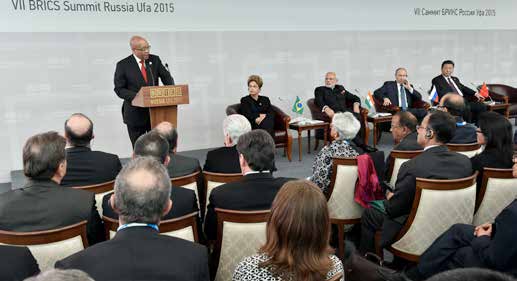 The BRICS nations was hosted by Russian President Vladimir Putin from 8 to 9 July 2015, under the theme: “BRICS Partnership – a Powerful Factor of Global Development”.
The BRICS nations was hosted by Russian President Vladimir Putin from 8 to 9 July 2015, under the theme: “BRICS Partnership – a Powerful Factor of Global Development”.
The Summit was attended by government and business leaders from emerging economies who discussed an array of opportunities aimed at leading the growth of the world economy.
Government’s plans to boost the economy
Government’s plans to boost the economy JoyProgramme of Action
President Jacob Zuma has expressed concern over electricity shortages and challenges facing the mining sector in South Africa, but remains positive that the country’s economy will grow steadily to at least 3 per cent over the next three years.
 Recently, the President updated the country on government’s progress in implementing its Programme of Action (PoA) in the first year of the Medium Term Strategic Framework (MTSF), as outlined in his State of the Nation Address (SONA) in February.
Recently, the President updated the country on government’s progress in implementing its Programme of Action (PoA) in the first year of the Medium Term Strategic Framework (MTSF), as outlined in his State of the Nation Address (SONA) in February.
The PoA is government’s major plans for the year ahead as announced in the SONA.
The MTSF is government’s strategic plan for the 2014-2019 electoral term. It reflects the commitments made in the election manifesto of the governing party, including the commitment to implement the National Development Plan. The MTSF sets out the actions that government will take and targets to be achieved.
The MTSF also provides a framework for the other plans of national, provincial and local government.
A 3 per cent economic growth is expected despite the slow economic growth globally, as government expects the electricity constraint to ease.
“Our estimate is that electricity shortages are currently costing the economy close to one percentage point in economic growth,” noted the President.
However, he said substantial progress had been made in resolving the energy challenge in the country since the inception of the five-point plan in December 2014.
The five-point plan was adopted by Cabinet to address electricity challenges.
“The operations and maintenance practices at Eskom continue to improve, to ensure that the power plants are appropriately maintained and provide electricity within their capacity.
“Eskom has signed Short-Term Power Purchase (STPP) Agreements that bring additional supply of electricity, to cater for the shortfall due to maintenance and to match demand during peak periods. A further 800 megawatts will be added to the grid through co-generation,” said President Zuma.
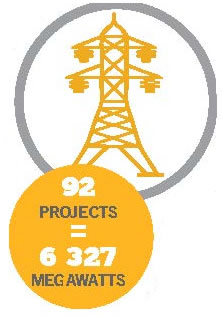 He added that a saving of 450 megawatts had been realised through the energy efficiency programmes.
He added that a saving of 450 megawatts had been realised through the energy efficiency programmes.
President Zuma said various projects of the Renewable Energy Independent Power Producer Programme (REIPPP) currently supplies 1 800 megawatts to the grid.
“Within the next two and a half years, the 92 projects of the renewable energy programme will bring a total of 6 327 megawatts to the grid.”
The exploration of other options for electricity generation is underway, including cross-border projects within the Southern African Development Community (SADC) region that include hydro, gas and coal.
For the medium to long-term electricity supply, the President said the nuclear build programme was at an advanced stage of planning, and the procurement should be concluded within the current financial year.
He said the updated Gas Utilisation Master Plan, which would stimulate development and investment in the gas industry, would be published
The President added that the South African economy, as with many economies in the world, continued to struggle to fully regain its pre-financial crisis growth momentum.
“We committed ourselves to a 5 per cent growth rate by 2019. The 1.5 per cent economic growth rate attained in 2014, is a distance from that NDP ambition,” he said.
To address this, the government developed the Nine Point Plan, announced in February, to look for growth opportunities. The plan includes:
- Revitalisation of the agriculture and agro-processing value-chain.
- Advancing beneficiation (adding value to our mineral wealth).
- More effective implementation of a higher impact Industrial Policy Action Plan.
- Unlocking the potential of SMME, cooperatives as well as township and rural
- enterprises.
- Resolving the energy challenge.
- Stabilising the labour market.
- Scaling-up private-sector investment.
- Growing the ocean economy.
- Cross-cutting areas to reform, boost and diversify the economy such as the following:
- Science, technology and innovation
- Water and sanitation
- Transport infrastructure
- Broadband rollout
- State-owned companies
Youth empowerment
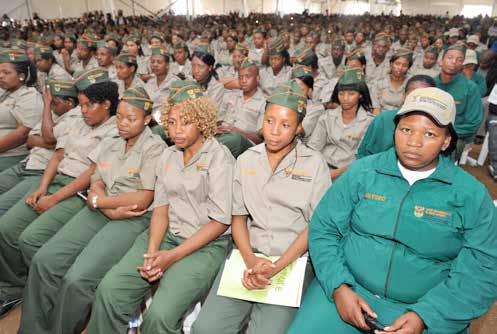 In May this year, Cabinet adopted the National Youth Policy. The Presidential Youth Working Group has been established, made up of youth formations and government. Led by the Deputy Minister for Planning, Monitoring and Evaluation, Buti Manamela, the Working Group helps to coordinate the implementation of the youth policy.
In May this year, Cabinet adopted the National Youth Policy. The Presidential Youth Working Group has been established, made up of youth formations and government. Led by the Deputy Minister for Planning, Monitoring and Evaluation, Buti Manamela, the Working Group helps to coordinate the implementation of the youth policy.
The programmes being implemented include:
- Youth entrepreneurship and cooperatives training and mentorship.
- Reform and review of the National Students Financial Aid Scheme.
- To increase enrolments in universities and vocational training colleges.
- Implementing youth employment programmes such as the installation of solar water geyser and set top boxes.
- Implementation of public employment programmes and fostering values for the formation of an ideal citizen.
Mining
The President said government was concerned about the threat of job losses in the mining and steel sectors particularly because job losses would have a negative impact on many families, communities and the economy.
He said mining remained an important component of the South African economy and government wanted it to remain the backbone of the country’s economy.
His comments follow recent announcements by several mining companies of their intention to retrench workers.
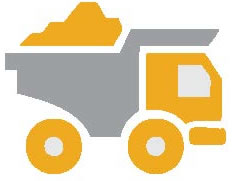 To address this, the Minister of Mineral Resources Ngoako Ramatlhodi convened a retreat of tripartite stakeholders in the mining sector recently.
To address this, the Minister of Mineral Resources Ngoako Ramatlhodi convened a retreat of tripartite stakeholders in the mining sector recently.
Stakeholders identified a number of areas to save jobs and to find alternatives to job losses. A task team was established and has been asked to develop detailed proposals.
The Presidential Business Working Group (PBWG), which was convened few days before the President gave the SONA update, mandated government and the Chamber of Mines to seek an amicable solution outside of the courts, to the notion of “once empowered, always empowered” in the Mining Charter.
Meanwhile, the Mineral and Petroleum Resources Development Amendment Bill was referred back to Parliament to address, among other things, consultation at the National Council of Provinces, which was considered to have not been adequate.
The President further added the first results delivery methodology Operation Phakisa was successfully launched in the health and ocean economy sectors last year.
President Zuma will launch a Mining Phakisa before the end of the year, which will look at minerals beneficiation.
“The mining sector is facing difficulties as well ... We don’t want workers to lose jobs,” said the President.
Drawing-in investment
 The roll-out of the Special Economic Zones (SEZs) programme will continue, said President Zuma, as there is a need to improve regulatory efficiency and turnaround times to support investments in the country.
The roll-out of the Special Economic Zones (SEZs) programme will continue, said President Zuma, as there is a need to improve regulatory efficiency and turnaround times to support investments in the country.
The SEZs support a broader-based industrialisation growth path in South Africa, while helping the country achieve the objectives of the NDP.
He said this was also among the critical points discussed during the meeting of the PBWG.
“More importantly, the establishment of an investment facilitation centre or One Stop Shop (OSS) is being implemented to support local and international investments. A pilot has been set up at the Department of Trade and Industry,” he said.
The President said the centre would improve the investment climate and enhance the ease of doing business by identifying bottlenecks, removing administrative barriers, reducing regulatory inefficiencies, setting up norms and standards, improving turnaround times and coordinating and fast-tracking all investment enquiries.
IMC on Immigration Regulations
 While giving the SONA update, President Zuma also announced the establishment of an Inter-Ministerial Committee (IMC) on Immigration Regulations, following concerns raised about the new visa regulations.
While giving the SONA update, President Zuma also announced the establishment of an Inter-Ministerial Committee (IMC) on Immigration Regulations, following concerns raised about the new visa regulations.
Under the new immigration legislation amendments, which came into effect in June, South Africans and foreign nationals travelling to and from South Africa with children under the age of 18 are required to produce unabridged birth certificates.
The new legislation is part of government’s commitment to safeguard the best interests of children and prevent child trafficking.
“The IMC will address the unintended consequences of the new immigration regulations on various sectors, including tourism and investment,” he said.
The IMC is chaired by Deputy President Cyril Ramaphosa and comprises the Ministers of Tourism, Home Affairs, Trade and Industry, Social Development and Small Business Development.
Water and Sanitation
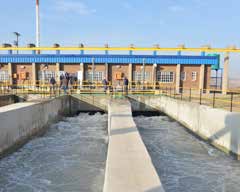 In an attempt to create more jobs and save water, the President said he would officially launch a programme, in Port Elizabeth, which seeks to train about 15 000 artisans and plumbers in the country.
In an attempt to create more jobs and save water, the President said he would officially launch a programme, in Port Elizabeth, which seeks to train about 15 000 artisans and plumbers in the country.
He said 3 000 trainees have made the list of first intakes recruited this financial year, and they would fix leaking taps in their communities.
The recruitment process will be done through the Department of Water and Sanitation. The President said this would stop the leaking of water which costs the country R7 billion a year.
“Government has identified water as a critical resource for economic development and work continues to implement the five point plan for water and sanitation,” he said.
The plan entails:
- Maintaining and upgrading existing water and sanitation infrastructure
- Building new dams and developing ground water
- Improving water quality
- Developing SMART technologies for water and sanitation information management; and
- Ensuring an enhanced and integrated regulatory regime, for example water use licensing.
“A review of both the Water Services and National Water Acts will be undertaken,” he said.
Education and health
Did you know?
The Department of Higher Education and Training currently runs a Career Development Services Centre to help learners with career advice. Learners can reach the Centre as follows:
SMS or “Please Call Me”: 072 204 5056;
e-mail: careerhelp@dhet.gov.za;
www.facebook.com/careerhelp
http://twitter.com/rsacareerhelp
Website: www.careerhelp.org.za
National Career Advice Portal: http://ncap.careerhelp.org.za
Walk-in Centre: 123 Francis Baard Street, Pretoria.
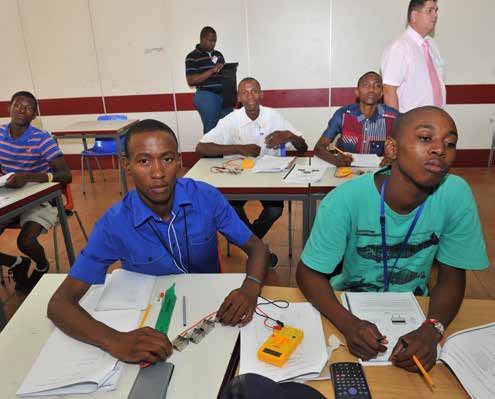 Meanwhile, President Zuma said the implementation of the Mathematics, Science and Technology Strategy would be strengthened in all schools.
Meanwhile, President Zuma said the implementation of the Mathematics, Science and Technology Strategy would be strengthened in all schools.
This following the 2014 Annual National Assessments (ANA) results, which indicated that Grade 3 targets in both literacy and numeracy have been exceeded, including Grade 6 Home Language, but performance in Grade 6 and 9 Maths and First Additional Language was below par.
“We welcome these positive developments and thank parents for cooperation which enables us to register progress as government,” said the President.
He added that government would also ensure improved teacher supply, training and development.
“The improvement of the qualifications of Grade R practitioners is also ongoing as part of the long-term investments in quality education,” said the President.
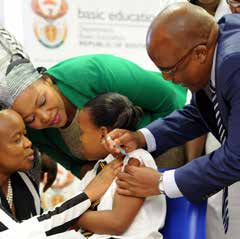 On the health front, President Zuma said South Africa has been praised by the United Nations AIDS programme (UNAIDS) for its successful response to HIV and AIDS.
On the health front, President Zuma said South Africa has been praised by the United Nations AIDS programme (UNAIDS) for its successful response to HIV and AIDS.
“Among the achievements, access to anti-retroviral treatment for people living with HIV and AIDS was expanded. To date, 3.1 million people are receiving treatment. This has exceeded the 2014/15 target of 3 million.
“The screening for Tuberculosis (TB) has been expanded, with 15.2 million people reached, which exceeded the target of 6 million.
“We thank all South Africans for their cooperation which is enabling the country to achieve a turnaround on HIV and Aids and to improve our response to TB,” the President said.
Debts due to municipalities
He urged government entities and the private sector to pay their debts to enable municipalities to function effectively.
To date, debt owed to municipalities is close to R100 billion, which is almost double the amount since 2009, the President noted.
He said while municipalities had been directed to pay their debts, debt owed to municipalities was not given sufficient attention.
Did you know?
The Operation Phakisa Mining Lab will identify a set of concrete problems that are limiting the growth and developmental impact of the sector.
The Mining Lab will also collaboratively develop plans to overcome these
challenges. A four-week Mining Lab is scheduled for October 2015.
Operation Phakisa: Faster, better and effective services
Operation Phakisa: Faster, better and effective services JoyPresident Jacob Zuma says government will implement two more segments of Operation Phakisa in an effort to fast-track service delivery.
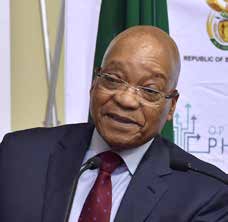 Operation Phakisa is currently being implemented in the ocean and health sectors while new segments are being planned for education and mining.
Operation Phakisa is currently being implemented in the ocean and health sectors while new segments are being planned for education and mining.
By October, Operation Phakisa Mining will start running under the Mining Phakisa Laboratory while Operation Phakisa in Basic Education will also begin between August and September.
Operation Phakisa is a government initiative adopted from the Malaysian government aimed at implementing priority programmes faster, better and more effectively.
“Operation Phakisa comes from Malaysia’s Big Fast Results Methodology which that country used successfully to achieve rapid economic transformation,” explained President Zuma during an update on progress made in the implementation of Operation Phakisa recently.
It also forms part of government’s Nine Point Plan to grow the economy and create more jobs.
“We launched Operation Phakisa last year, starting with the Ocean Economy and later unveiled the ideal clinic initiative.
“We are happy with the progress made thus far with Operation Phakisa and look forward to the launch of the new segments,” added the President.
Ocean economy
The Ocean Economy Phakisa focuses on four major areas namely: marine transport, off shore oil and gas, aquaculture and marine protection services, and ocean governance.
A study conducted by Nelson Mandela Metropolitan University (NMMU) quantified the value of South Africa’s ocean.
“In the initial study in 2010, the oceans around South Africa were estimated to have a potential to contribute about R54 billion to the Gross Domestic Product and an estimated 316 000 thousand jobs,” explained President Zuma.
Between July and August of 2014, the ocean’s laboratory phase was implemented in Durban. The phase focused on initiatives across the ocean economy as a whole.
“It focused on initiatives which are able to deliver significant impact within the next five years and beyond and to lay the groundwork for sustained long-term growth, not only in the four priority areas, but also across the ocean economy as a whole.”
To increase the contribution of the ocean economy, the President said various opportunities would be explored in other areas related to the ocean economy.
“Opportunities are being explored in the various areas, one being the repairing of rigs and the servicing of vessels.”
He added that the country should take advantage of the number of vessels using South Africa’s oceans.
“Thirty thousand vessels pass through South Africa’s waters every year and 13 000 dock in our ports every year.”
The President added that more needed to be done to improve infrastructure to accommodate the high number of vessels passing through South Africa’s waters.
Some three hundred million tons of cargo on foreign owned vessels are shipped and 1.2 million tons of liquid pass along South Africa’s coasts annually.
“In this regard, significant investment is required in the new port infrastructure including rig repairs. The establishment of a small Harbours Development is thus necessary.”
He added that government is planning to rehabilitate five ports to unlock the potential of the coastline.
“We have identified Gansbaai, Saldanha Bay, Struisbaai, Gordons Bay and Lamberts Bay for rehabilitation.”
Three provinces will also get new harbours. “A roadmap has also been developed for the proclamation of new harbours in the Northern Cape, Eastern Cape and KwaZulu-Natal.”
Operation Phakisa Ideal Clinic
The President also reported that the building of Ideal Clinics is on track. Operation Phakisa Ideal Clinic Realisation and Maintenance, launched in November last year, is improving services in public clinics. It is aimed at transforming public sector clinics into clinics that will provide good quality care to all communities.
The ideal clinic is expected to open on time in the morning; does not close until the last patient has been assisted even if it’s beyond operating hours; is staffed by health care professionals who treat people with dignity; is very clean and has reasonable waiting times.
President Zuma said through Operation Phakisa, progress has been made in achieving some of the desired elements of the health segment.
“Progress made thus far includes the implementation of the Central Chronic Medicine Dispensing and Distribution Programme.
“This is a medicine distribution programme for stable patients who do not need to see a doctor or a nurse, but are just coming to collect their monthly supply of medication,” he explained.
Further, the President said architectural designs for the Ideal Clinic have been finalised which will be used in the building or refurbishing of Ideal Clinics. "Using the same designed, 216 new clinics are going to be buit. In eight clinics, contractors are already on sie, in OR Tambo District in the Eastern Cape. In another eight, contractors are already on site." The President added that under the programme, supplies are delivered to specific locations agreed by the patient and government. The programme has helped over 200 000 patients who no longer have to sit in long queues waiting for their medication.
Jobs: Department of Social Development Sept 2015
Jobs: Department of Social Development Sept 2015 JoyDeputy Director-General: Non-Profit Organisations
Package: R1,267,806.00 p.a. This inclusive remuneration package consists of a basic salary, the states’ contribution to the Government Employees Pension Fund and a flexible portion that may be structured i.t.o. the applicable rules.
Centre: Pretoria, HSRC Building
Requirements: Applications are invited from persons in possession of a Bachelor’s Degree or equivalent qualification (NQF level 7) and a post graduate qualification (NQF level 8) plus 8 – 10 years of experience at a senior management level. Credible experience in NPO governance and/or administration. Knowledge of the public service legislation. Knowledge and understanding of the NPO legal framework. Knowledge and understanding of government development strategies.
Competencies: Strategic capability and leadership skills. Programme and project management skills. Financial management skills. Policy analysis and development skills. Information and knowledge management skills. Communication (written, verbal and liaison) skills. Service delivery innovation. Problem-solving and change management skills. People management and empowerment skills. Client orientation and customer focus. Stakeholder management skills. Presentation and facilitation skills. Change management skills.
Attributes: Good interpersonal relationship. Ability to work under pressure. Innovative and creative. Ability to work in a team and independently. Confidentiality. Adaptability. Diplomatic. Independent thinker. Cost consciousness. Honesty and Integrity.
Lead the review, development and implementation of the administrative and regulatory framework within which the non-profit organisations can conduct their affairs. Lead processes to create an environment in which non-profit organisations can flourish and maintain adequate standards of governance, transparency and accountability. Ensure the implementation of an efficient administrative and information management system for registration and accessibility of reliable information concerning registered non-profit organisations. Lead the development and implementation of multi-sectoral and multi-disciplinary programs. Promote a spirit of co-operation and shared responsibility with other organs of state donors and amongst other interested persons in their dealings with non-profit organisations.
Duties: Lead the review, development and implementation of the administrative and regulatory framework within which the non-profit organisations can conduct their affairs. Lead processes to create an environment in which non-profit organisations can flourish and maintain adequate standards of governance, transparency and accountability. Ensure the implementation of an efficient administrative and information management system for registration and accessibility of reliable information concerning registered non-profit organisations. Lead the development and implementation of multi-sectoral and multi-disciplinary programs. Promote a spirit of co-operation and shared responsibility with other organs of state donors and amongst other interested persons in their dealings with non-profit organisations.
Enquiries: Mr TW Magwaza Tel: (012) 312-7647
DIRECTOR: Community And Capacity Enhancement
Chief Directorate: HIV/AIDS and Burdens of the Diseases
PACKAGE: R864 177 p.a. This inclusive remuneration package consists of a basic salary, the states’ contribution to the Government Employees Pension Fund and a flexible portion that may be structured i.t.o. the applicable rules. The successful candidate will be required to enter into a performance agreement and to sign an employment contract.
CENTRE: Pretoria, HSRC Building
Requirements: An appropriate Bachelors Degree (NQF level 7) in Social Science or equivalent qualification PLUS five (5) years’ experience at middle/senior managerial level in the field of HIV/AIDS, TB and STIs as well as Capacity Building. Knowledge of the relevant public service legislation. Knowledge and understanding of human behaviour and social system. Knowledge of relevant policies and strategies pertaining to social services and HIV/AIDS, TB and STIs.
Competencies needed: Programme and Project management skills. People management and empowerment skills. Policy development and formulation skills. Presentation skills. Communication (written and verbal) skills. Client orientation and customer focus skills. Change management skills. Interpersonal skills. Knowledge management skills. Planning and organising skills. Problem solving skills. Analytical skills. Counselling skills. Strategic capability and leadership skills. Stakeholder management skills. Computer literacy. Financial management skills. Research skills. Facilitation and training skills. Influencing skills.
Attributes: Confidence. Honesty and integrity. Accuracy. Diplomacy. Assertiveness. Compliance. Ability to work under pressure. Ability to work in a team and independently. Creative and innovative. Business ethics.
ENQUIRIES: Ms N Majola Tel: (012) 312-7549
Note: A curriculum vitae with a detailed description of duties, the names of two referees, certified copies of qualifications and identity document must accompany your signed application for employment (Z83). • In the event of hand delivery of applications, applicants must sign an application register book as proof of submission. • All shortlisted candidates for SMS posts will be subjected to a technical exercise that intends to test relevant technical elements of the job, the logistics of which will be communicated by the Department. Following the interview and technical exercise, the selection panel will recommend candidates to attend a generic managerial competency assessment (in compliance with the DPSA Directive on the implementation of competency based assessments). The competency assessment will be testing generic managerial competencies using the mandated DPSA SMS competency assessment tools. • The successful candidate for a SMS post will sign an annual performance agreement, complete a financial disclosure form and also be required to undergo a security clearance. • If the candidate is applying for an OSD post, certificates of service must be attached to the CV. • No faxed or e-mailed applications will be considered. • It is the applicant’s responsibility to have foreign qualifications evaluated by the South African Qualification Authority (SAQA). • Failure to submit the requested documents will result in your application not being considered. • Personnel suitability checks will be conducted on short listed candidates and the appointment is subject to positive outcomes of the checks. • Correspondence will be limited to shortlisted candidates only. • The selection of candidates will be done with due regard to the relevant aspects of the selection process as set out in the Public Service Regulations, 2001 (as amended) Part VII/D. • Applications received after the closing date will not be taken into consideration. • If you have not been contacted within three months after the closing date of this advertisement, please accept that your application was unsuccessful. • Candidates requiring additional information regarding the advertised post may direct their enquiries to the person as indicated.
It is our intention to promote representivity (race, gender and disability) in the Public Service through the filling of these posts and candidates whose transfer / promotion/ appointment will promote representivity will receive preference.
APPLICATIONS: The Director General, Department of Social Development, Private Bag X901, Pretoria, 0001, Physical Address: HSRC Building, 134 Pretorius Street
FOR ATTENTION: Ms E de Waal
CLOSING DATE: 17 September 2015
Jobs: Department of Correctional Services
Jobs: Department of Correctional Services Estelle GreeffAppointments under the Correctional Services Act
AREA COORDINATOR CORRECTIONS
FS & NC Region: Bizzah Makhate Centre B (FS/NC09/01)
Inclusive package: R 587 907.00 per annum
Requirements: Degree/ National Diploma in Behavioural Sciences or equivalent qualification and 7 years relevant experience on supervisory level. These requirements are in accordance with the Occupational Specific Dispensation. Top secret security classification as an added advantage. Successful completion of Corrections Science Learner ship/Basic Training. Valid driver’s licence. Computer Literate.
Competencies and attributes: Firearm skills and the use of relevant security technology. Communication, Project and programme management, Transformation management, Change Management, Stake-holder management, Problem solving, Analysis, Service Delivery Innovation, decision making, People Management and Empowerment, In depth understanding of safety and security in a correctional environment. Integrity and honesty, Confidentiality, Good Interpersonal relations, knowledge of the Correctional Services Act, Act 111 of 1998, as amended. Assertiveness, Ability to network, Diplomacy and tactful, Resilient, Influence and impact.
Responsibilities: Implement and monitor correctional, security and facility policies and procedures, Co-ordinates the collation and dissemination of security and correction information, Coordinates activities relating to critical DCS support structures such as the Parole Boards and Office of the Inspecting Judge within the management area, Promote corrections and security awareness, Provision of early warning intelligence correction and security risk., Manage human resources, finances and assets.
CENTRE COORDINATOR STAFF SUPPORT
FS & NC Region: Bizzah Makhate Centre B (FS/NC09/02)
R 349 653.00 per annum
Requirements: Relevant B degree/National Diploma and 7 years relevant experience gained on supervisory level. Successful completion of Corrections Science Learner ship/Basic Training. These requirements are in accordance with the relevant Occupational Specific Dispensation. Valid driver’s licence. Computer literate.
Competencies and attributes: Firearm skills and the use of relevant security technology. Communication, Project and programme management, Transformation management, Change Management, Stakeholder management, Problem solving, Analysis, Service Delivery Innovation, decision making, People Management and Empowerment, In depth understanding of safety and security in a correctional environment. Integrity and honesty, Confidentiality, Good Interpersonal relations, In depth knowledge of the Correctional Services Act, Act 111 of 1998, as amended. Assertiveness, Ability to network, Diplomacy and tact, Resilience, Influence and impact.
Responsibilities: Effective management of the registration activities. Act as labour relations officer for the centre. Act as information officer for the correctional centre. Financial administration, Performance assessment of staff. Act as loss control officer for the centre. Manage human resources, finance and assets.
MANAGER CORRECTIONS
FS & NC Region: AC Groenpunt (FS/NC09/03)
Salary: R 301 617. 00 per annum
Requirements: Relevant B degree/National Diploma and 7 years relevant experience gained on supervisory level. These requirements are in accordance with the relevant Occupational Specific Dispensation. Successful completion of Corrections Science Learner ship/Basic Training. Valid driver’s licence. Computer literacy.
Competencies and attributes: Firearm skills and the use of relevant security technology. Communication, Project and programme management, Transformation management, Change Management, Stakeholder management, Problem solving, Analysis, Service Delivery Innovation, decision making, People Management and Empowerment, In depth understanding of safety and security in a correctional environment. Integrity and honesty, Confidentiality, Good Interpersonal relations, knowledge of the Correctional Services Act, Act 111 of 1998, as amended. Assertiveness, Ability to network, Diplomacy and tact, Resilience, Influence and impact.
Responsibilities: Manage and process documentation to /from Correctional Centre or Community Corrections Centre. Management of classified information. Management of policy documentation of DCS. Investigate incidents. Management of human resources, finances and assets.
SH NUTRITIONAL SERVICES
FS & NC Region Grootvlei Max (FS/NC09/04)
Salary: R 292 830.00 per annum
Requirements: Degree/ National Diploma with at least seven (7) years relevant experience gained on supervisory level. Valid driver’s licence. Computer Literate.
Competencies and attributes: Firearm skills and the use of relevant security technology. communication, project and programme management, transformation management, change management, stakeholder management, problem solving, analysis, service delivery Innovation, decision making, people management and empowerment, in depth understanding of safety and security in a correctional environment, integrity and honesty, confidentiality, good inter-personal relations, knowledge of the Correctional Services Act, Act 111 of 1998, as amended, assertiveness, ability to network and diplomacy.
Responsibilities: Ensure the proper preparation of meals, Serving of meals. Ensure the cleaning of utensils, kitchens, serveries. Training of offenders as caterers. Screening of offenders. Control of security equipment (keys, batons, teargas, radios). Supervise the unlocking of offenders. Control of catering equipment (knives, crockery etc.). Ensure medical parades. Supervision of recreation activities. Dealing with problematic offenders. Searching of kitchen. Treatment of offenders. Management of human resources, finances and assets
CENTRE COORDINATOR STAFF SUPPORT X3
FS &NC Region: Betlhehem (FS/NC09/05), Harrismith (FS/NC09/06), Bizzah Makhate Comcorr (FS/NC09/07)
Salary: R 292 830.00 per annum
Requirements: Recognised three (3) year degree/ National Diploma or equivalent qualification and 7 years relevant experience gained in a supervisory level. Successful completion of Corrections Science Learner ship/Basic Training. These requirements are in accordance with the relevant Occupational Specific Dispensation. Valid driver’s licence. Computer literate.
Competencies and attributes: Firearm skills and the use of relevant security technology. Communication, Project and programme management, Transformation management, Change Management, Stakeholder management, Problem solving, Analysis, Service Delivery Innovation, decision making, People Management and Empowerment, In depth understanding of safety and security in a correctional environment. Integrity and honesty, Confidentiality, Good Interpersonal relations, In depth knowledge of the Correctional Services Act, Act 111 of 1998, as amended. Assertiveness, Ability to network, Diplomacy and tact, Resilience, Influence and impact.
Responsibilities: Provide human resources and related functions to the correctional centre. Effective management of the registration activities. Ensure proper dissemination of information for the correctional centre. Manage duty register and leave arrangements. Management of financial and human resources and assets.
CENTRE COORDINATOR OPERATIONAL SUPPORT
FS & NC Region: Sasolburg (FS/NC09/08)
Salary: R 292 830.00 per annum
Requirements: Degree/ National Diploma in Behavioural Science or an equivalent qualification and 7 years relevant experience in a supervisory post. These requirements are in accordance with the Occupational Specific Dispensation. Top secret security classification as an added advantage. Successful completion of Corrections Science Learner ship/Basic Training. Valid driver’s licence. Computer Literate.
Competencies and attributes: Firearm skills and the use of relevant security technology. Computer literate. Communication, Project and programme management, Transformation management, Change Management, Stakeholder management, Problem solving, Analysis, Service Delivery Innovation, decision making, People Management and Empowerment, In depth understanding of safety and security in a correctional environment. Integrity and honesty, Confidentiality, Good Interpersonal relations, knowledge of the Correctional Services Act, Act 111 of 1998, as amended. Assertiveness, Ability to network, Diplomacy and tactful.
Responsibilities: Execution of control regarding safe custody, physical care and treatment. Create secure environment conducive for rehabilitation. Execution of control regarding the establishment and rendering of security. Provide advice on departmental policy directives. Management of inmates’ safe custody (internal and external security). Management of development and care and health care services. Management of human resources and assets.
CENTRE COORDINATOR CORRECTIONS
FS & NC Region: Ventersburg (FS/NC09/09)
Salary: R 292 830.00 per annum
Requirements: Relevant B degree/National Diploma and 7 years relevant experience in a supervisory post. These requirements are in accordance with the relevant Occupational Specific Dispensation. Successful completion of Corrections Science Learner ship/Basic Training. Valid driver’s licence. Computer literacy.
Competencies and attributes: Firearm skills and the use of relevant security technology. communication, project and programme management, transformation management, change management, stakeholder management, problem solving, analysis, service delivery Innovation, decision making, people management and empowerment, in depth understanding of safety and security in a correctional environment, integrity and honesty, confidentiality, good inter-personal relations, knowledge of the Correctional Services Act, Act 111 of 1998, as amended, assertiveness, ability to network and diplomacy.
Responsibilities: Ensure the development of correctional sentence plan and facilitate the implementation thereof. Execute correctional policies and procedures. Coordinates the collation and dissemination of correction information. Coordinates activities relating to rehabilitation programme, case management administration, case management committee and unit management systems. Promote corrections and security. Manage human resources, finance and assets.
DH CASE/CENTRE MANAGEMENT ADMINISTRATION
FS & NC Region: Goedemoed Med A (FS/NC09/10)
Salary: R 292 830.00 per annum
Requirements: Relevant B degree/National Diploma and 7 years relevant experience in a supervisory post. These requirements are in accordance with the Occupational relevant Specific Dispensation. Top secret security classification as an added advantage. Successful completion of Corrections Science Learnership/Basic Training. Valid driver’s licence. Computer literacy.
Competencies and attributes: Firearm skills and the use of relevant security technology. communication, project and programme management, transformation management, change management, stakeholder management, problem solving, analysis, service delivery Innovation, decision making, people management and empowerment, in depth understanding of safety and security in a correctional environment, integrity and honesty, confidentiality, good inter-personal relations, knowledge of the Correctional Services Act, Act 111 of 1998, as amended, assertiveness, ability to network and diplomacy.
Responsibilities: Manage admission and release of inmates. Control inmate’s movement. Administrate inmate’s cash. Maintain inmate’s records. Administrate fine/bail payments. Administrate inmates labour. Maintain safe custody by personnel. Manage intimate’s privileges. Management of financial and human resources and assets.
HEAD CORRECTIONAL CENTRE
FS & NC Region: Heilbron (FS/NC09/11)
Salary: R 292 830.00 per annum
Requirements: Relevant B degree/National Diploma and 7 years relevant experience gained on supervisory level. These requirements are in accordance with the relevant Occupational Specific Dispensation. Successful completion of Corrections Science Learnership/Basic Training. Valid driver’s licence. Computer literacy.
Competencies and attributes: Firearm skills and the use of relevant security technology. communication, project and programme management, transformation management, change management, stakeholder management, problem solving, analysis, service delivery Innovation, decision making, people management and empowerment, in depth understanding of safety and security in a correctional environment, integrity and honesty, confidentiality, good inter-personal relations, knowledge of the Correctional Services Act, Act 111 of 1998, as amended, assertiveness, ability to network.
Responsibilities: Management of all aspects of the correctional centre on a day to day basis through the implementation of Correctional Services Act, Act 111 of 1998 as amended, Manage the implementation of the imperatives of White Paper on Corrections. Management of case management administration, security, development and care, unit management and case management committees. Foster a working relationship with the Justice Cluster and the Community. Monitor, evaluate and take appropriate action in relation to outcomes on the risk trends. Manage human resources, finances and assets/.
UNIT MANAGER X 6
FS & NC Region: Bizzah Makhate Centre A x 4 (FS/NC09/12), Goedemoed Med B(FS/NC09/13), Grootvlei Max (FS/NC09/14)
Salary: R 292 830.00 per annum
Requirements: Relevant B degree/National Diploma and 7 years relevant experience gained on supervisory level. These requirements are in accordance with the relevant Occupational Specific Dispensation. Successful completion of Corrections Science Learnership/Basic Training. Valid driver’s licence. Computer literacy.
Competencies and attributes: Firearm skills and the use of relevant security technology. communication, project and programme management, transformation management, change management, stakeholder management, problem solving, analysis, service delivery Innovation, decision making, people management and empowerment, in depth understanding of safety and security in a correctional environment, integrity and honesty, confidentiality, good inter-personal relations, knowledge of the Correctional Services Act, Act 111 of 1998, as amended, assertiveness, ability to network and diplomacy.
Responsibilities: Implement unit management within the unit. Liaise with Head of Correctional Centre, CMC and other role players. Manage prisoner Development Staff (PDS). Implement a structured day programme in conjunction with the PDS.
CLOSING DATE: 30 September 2015 @ 15H45
Note: Before you apply: All costs associated with an application will be borne by the applicant. The Department of Correctional Services is an equal opportunity employer. The Department will take into consideration the objectives of Section 195 (1) (i) of the Constitution of the Republic of South Africa, 1996 (Act 108 of 1996) and the Employment Equity Act, 1998 (Act 55 of 1998) in filling of these vacancies. It is our intention to promote representivity in respect of race, gender and disability through the filling of these positions. In support of this strategy, applicants need to indicate race, gender and disability status on the application form/CV. Applicants who have retired from the Public Service with a specific determination that they cannot be re-appointed or have been declared medically unfit will not be considered.
Please take note that correspondence will only be conducted with the shortlisted candidates. If you have not been contacted within three (3) months of the closing date of the advertisement, please accept that your application is unsuccessful. Applicants must note that further checks will be conducted once they are shortlisted and that their appointment is subject to positive outcomes on these checks, which include security clearance, security vetting, qualification verification, and criminal records verification. Appointment to some of these posts will be provisional, pending the issue of a security clearance. If you cannot get a security clearance, your appointment will be re-considered/possibly terminated. Finger prints may be taken on the day of interviews.
The Department of Correctional Services reserves the right not to fill any of these advertised posts.
Applications: Applications must be submitted on form Z83 (Public Service Application form), obtainable from any Public Service Department, and must be completed in full. Applications must be accompanied by a CV, certified copies of qualifications and ID NOT older than 3 months. Where an advertisement states that a valid Driver’s Licence is required, then please submit a certified copy of your licence. Please send a separate and complete application for each post you apply for, stating the correct reference for each position you are interested in. Faxed and e-mailed applications will not be accepted • Candidates must comply with the minimum appointment requirements • CV’s should be aligned to reflect one’s degree of compliance with the above-mentioned requirements and responsibilities. Applications must reach DCS before the closing date and time. It is the sole responsibility of an applicant to ensure that their application reaches DCS before the stipulated closing date and time.
NB: Indicate the reference number and position you are applying for on your application form (Z83) and post your complete application to the address as indicated below:
Free State/Northern Cape Region:
Postal Address: Head Recruitment, Private Bag X20530, Bloemfontein, 9300
Contact person: Ms J Chabane at 051 404 0270/ 051 4040 277 or 051 4040283
Physical Address: 103 Zastron Street, Agrimed Building, Bloemfontein
Appointments under the Public Service Act
Implement a structured day programme in conjunction with the PDS. Implement the three meal system as part of the structured day program. Ensure that case files are opened for all offenders and that sentence plans are compiled in conjunction with the CMC. Structure day programmes must make provision for the content of sentence plans. Compile case note and the recording thereof on the case files. Assess offenders in conjunction with the CMC. Register structural needs to enhance the implementation of unit management. Management of human and finance resources and assets.
DH FINANCE x 2
FS & NC Region: Kimberley (FS/NC09/15), Tswelopele (FS/NC09/16)
Salary: R 292 830.00 per annum
Requirements: Recognized three-year degree/diploma in Accounting or Financial Management and management with 7 years relevant experience gained on supervisory level. These requirements are in accordance with the Occupational Specific Dispensation. Valid driver’s licence. Computer literate.
Competencies and attributes: Financial management, Facilitation skills, Plan, organise, lead and control, Project management, Presentation skills, Conflict Management, Report writing, Time management, confidentiality, coaching and mentoring, understanding of Public Service Policy and legislative framework, Knowledge of the Correctional Services Act, Act 111 of 1998, Service delivery and Client orientation, Integrity and honesty, Assertiveness, Influence and impact, Communication skills, Decision making, Problem solving skills, Networking/liaison with stakeholders and Negotiation skills.
Responsibilities: Inspection of financial administration at the correctional centre, Ensuring the correct management of special function accounts, Ensuring control over all financial documentation, Ensure the correct management of ledgers, Ensuring of expenditure within the bounds of allocated funds, Investigation of irregularities in financial management at the correctional centre , Ensure the correct distribution of funds by Area Commissioners to lower level, The inclusion of approved new services/expansions in the budget, Submission of recommendations on the financing of activities Ensure that financial requirements by individual sections are correctly reflected on the appropriate budgetary responsibilities/objectives and on the budgetary reports, Ensure optimum utilization of resources, support with regard to management of budgets within the framework of relevant legal directives and regulations. Performing budget control and ensuring enforcement of financial discipline. Managing logistics and procurement. Management of human and finance resources and assets.
DH SECURITY
FS & NC Region: Groenpunt Max (FS/NC09/17)
Salary: R 292 830.00 per annum
Requirements: Relevant B degree/National Diploma and 7 years relevant experience gained on supervisory level. These requirements are in accordance with the relevant Occupational Specific Dispensation. Successful completion of Corrections Science Learner ship/Basic Training. Valid driver’s licence. Computer literacy.
Competencies and attributes: Firearm skills and the use of relevant security technology. communication, project and programme management, transformation management, change management, stakeholder management, problem solving, analysis, service delivery Innovation, decision making, people management and empowerment, in depth understanding of safety and security in a correctional environment, integrity and honesty, confidentiality, good inter-personal relations, knowledge of the Correctional Services Act, Act 111 of 1998, as amended, assertiveness, ability to network and diplomacy.
Responsibilities: Access control to correctional centre’s grounds. Manage internal security. Ensure that offenders are escorted to court, doctors and hospital safely. Ensure safe custody for offenders. Ensure the guarding of offenders in external hospitals and at work teams. Control access of offenders to and from the unit and to the cells. Ensure security equipment to staff. Patrol at the section (general accommodation areas, single cells, kitchens, hospitals and work sections. Escort offenders inside the centre, e.g. to different ODS’s such as Social Workers, CMC, Psychological services and educationists. Mann security systems. Supervise visits to offenders. Control security equipment. Search offenders entering and leaving the section. Management of Human and Finance resources and assets.
CONSTRUCTION PROJECT MANAGER X 2
FS & NC Region: Regional Office (FS/NC09/18)
Inclusive Package: R 552 489..00 per annum
Requirements: National Higher Diploma (Built Environment field) with a minimum of 4 years and six months certified experience or B Tech (Build Environment field) with a minimum of 4 years certified managerial experience or Honours degree in any Built Environment field with a minimum of 3 years’ experience. Compulsory registration with the SACPCMP as a Professional Construction Project Manager on appointment. Valid driver’s licence.
Competencies and attributes: Programme and project management, Project principles and methodologies, Research and development, Computer aided engineering applications, Knowledge of legal compliance, Technical report writing, Creating high performance culture, Technical consulting, Professional judgement. Decision making, Team leadership, Analytical skills, Creativity, Self-management, Financial management, Customer focus and responsiveness, Communication, Computer literacy, Planning and organization, Conflict management, Problem solving and analysis, People management, Change management and innovation.
Responsibilities: Manage and coordinate all aspects of projects. Project accounting and financial management, including the management of project budgets and resources. Office administration, including inputs with tender administration, liaison with service providers, clients and management and the maintenance of record management systems. Research and development, keeping up with new technologies and procedures and liaison with relevant bodies/councils on project management. Manage human resources, finance and assets.
AREA COORDINATOR: CORPORATE SERVICES
FS & NC Region AC Groenpunt (FS/NC09/19)
Inclusive Package: R 569 538.00 per annum
Requirements: Recognised Degree/ National Diploma in Human Resource Management with a minimum of 5-7 years management experience. Computer Literate and valid driver’s licence.
Competencies and attributes: Plan, organise, lead and control, facilitation skills, problem solving and decision making, financial management, team leadership, project management, safety and security awareness. Presentation, conflict management and report writing skills. Transformation and change management skills. Pro-active and vigilant, tactfulness and confidentiality, coaching and mentoring, assertiveness, stress tolerance, ability to work under pressure, discipline and committed. Good communication skills. Service delivery and client orientation. Understanding and adherence of Public Service legislative framework.
Responsibilities: The incumbent will be accountable for managing Human Resources Provisioning, Utilization, Development, special programmes (EAP, HIV/AIDS, and Equity) and Employee relations in the management area. The incumbent will also be responsible for budget management of corporate services as well as strategic issues. Performance management and monitoring is also a key responsibility. Employee wellness programmes will also be implemented by this incumbent. Management of human resources, finances and assets.
MANAGER LEGAL SERVICES MR5
FS & NC Region: AC Kimberley (FS/NC09/20)
Salary: R 287 292.00- R 708 765.00 per annum
Requirement: LLB or Equivalent and at least 8 years post graduate legal experience. Driver’s license. Computer Literate.
Competencies and attributes : Financial management. Problem solving and decision-making skills. Facilitation skills. Plan, organise, lead and control. Change Management. Team leadership. Project management. Presentation skill. Conflict management. Report writing. Computer literacy. Training and development. Time management. Confidentiality. Coaching and mentoring. Understanding of Public Service policy and legislative framework. Service delivery and client orientation. Integrity and honesty. Assertiveness. Ability to network. Willingness to travel. Applied strategic thinking. Influence and impact
Responsibilities: Initiation of policy amendments in DCS. Rendering of legal opinions on the activities of the Department Providing of legal training. Administrating of claims against the DCS. Undertaking of hearing/trials administration. Administration of motion applications on the application of policy in the management area. Administration of motion application on the content of policy in the DCS. Maintenance of legal libraries. Planning of activities. Management of Resources
MANAGER SOCIAL WORKER SERVICES
FS & NC Region: AC Kimberley (FS/NC09/21)
Inclusive Package: R 617 409.00 per annum
Requirements: BA degree in Social Work. Registration with the South African Council for Social Service Professions as Social Worker. A minimum of 10 years appropriate experience in Social Work after registration as a Social Worker with SACSSP. Computer literate and Valid driver’s licence.
Competencies and attributes: Plan and organize, report writing, punctuality, confidentiality, under-standing of Public Service policy and legislative frameworks, service delivery and client orientation, integrity and honesty, assertiveness, influence and impact, ability to work under pressure . Sound communication, negotiation, conflict and strategic management skills.
Responsibilities: Provide needs based social work service of an advanced nature within a defined area/s of specialization with regard to the care, development, correction and after care of offenders through the relevant departmental programmes is rendered. Provide mentorship and guidance to senior social worker (specialist) in order to assist them to integrate theory and practice and develop appropriate skills relevant to area of specialization. Monitor, interpret and review legislation and policies to determine whether the legislation and policies are still relevant and complies with current requirements. Develop proposals to change the relevant acts and policies to maintain them and research and develop new policies where required. Facilitate the development and planning of programmes and interventions to render a social work service through the efficient, economical and effective utilization of financial resources in compliance with the PFMA. Manage a social work unit to ensure that an efficient and effective social work service is delivered through the efficient and effective utilization of human resources. Keep up to date and ensure compliance with new developments in the social work / correctional social work field. Plan and ensure that social work research and development are undertaken. Under-take complex social work research. Perform and/or ensure that all administrative functions required in the unit are per-formed. Management of human resources, finances and assets.
ASSISTANT MANAGER NURSING (PHC)
FS& NC Region: AC Goedemoed (FS/NC09/22)
Salary: R 473 187.per annum
Requirements: Recognised three (3) year Degree/Diploma in Nursing or an equivalent qualification that allows registration with the South African Nursing Council as a Professional. Current registration with the South African Nursing Council as a Professional Nurse. A minimum of 10 years appropriate nursing experience after registration as professional nurse with the SANC in general nursing. At least 6 years of the period referred to above must be recognizable experience after obtaining the 1 year post basic qualification in the relevant speciality as well as management experience. Valid driver’s licence. Computer literate. These requirements are in accordance with the relevant Occupational Specific Dispensation. Valid driver’s licence. Computer literacy.
Competencies and attributes: Financial management, Problem solving and decision making, facilitation skills, plan, organize, lead and control, Project Management, Presentation skill, Conflict Management. Knowledge of nursing care process and procedure, nursing statues and other relevant legal frameworks, including grievances procedure and disciplinary code and procedure. Training and development, Report writing. Time management, Confidentiality, Coaching and mentoring, Understanding of Public Service policy and legislative framework, Service delivery and client orientation, integrity and honesty, Assertiveness, Influence and impact. Ability to network.
Responsibilities: Supervise the routine examination of offenders and treatment of minor ailments according to scope of practice. Supervise the assistance of immobile offender patients. Supervise the administration of medicine and other treatments. Supervise first aid and emergency series. Supervise sterilisation of equipment/facilities. Supervise the updating of offenders/s records. Counsel offender patients. Supervise medicine control maintain safe custody by nursing personnel. Identify offenders for medicines. Not medical condition as instructed by doctors. Man-age human resources, finance and assets.
CHIEF ARTISAN GRADE A PRODUCTION WORKSHOPS
FS & NC Region: Kimberley (FS/NC 09/24)
Salary: R 297 372.00 per annum
Requirements: Appropriate trade test certificate with 10 years post qualification experience required as an artisan/artisan foreman. Valid driver’s license.
Competencies and attributes: Relationship building, Innovation & creativity, People management time management, Openness & transparency, Integrity & honesty, Coaching & mentoring, Confidentiality, Interpersonal relations, Networking, Tact and computer skills.
Responsibilities: Policy development and interpretation. Monitoring, evaluation and support service to workshop personnel. Economic analysis of work-shop performance. Research and development of new workshop projects. Monitor and evaluate adherence to set service level standards for production workshop. Interpret the relevant workshop policies, manuals and legislation for workshop personnel. Conduct compliance inspection workshop policies, manuals and legislation. Compiling financial budgets and estimates Evaluate financial expenditure and control at all workshop facilities. Understand and apply good human resources relations with subordinates and workshop personnel. Monitor and evaluate the credibility and effective management of the workshops costing system and its reports. Management of human and financial resources and assets.
MANAGER INFORMATION TECHNOLOGY
FS & NC Region: AC Kimberley (FS/NC09/25)
Salary: R289 761.00 per annum
Requirements: A National Diploma or an A+, N+ and CCNA certificates with minimum 3 years’ experience in a network environment. A valid driver’s license.
Competencies and attributes: Strong communication and report writing skills, good understanding of MS Win-dows,2000/XP/Novel as well as the MS Office suite, Linux/Novell and Open Office Suite understanding, Experienced in switch configuration, good understanding of Information Technology policies and standards, good understanding of Networks Infrastructure management, good understanding of Information Technology Audit and Governance, procurement processes, good understanding computer systems analysis, good understanding system administration, good understanding of access methods including cable modems, DSL, satellite and wireless, must be proficient with Windows, especially its communications and networking capabilities, experience in VOIP protocols their performance from the edge thru the core of the network, experience in a wide range of data network access, from Analogue modems to Broadband Technologies (cable, DSL, Wire-less, etc. A working knowledge of current VOIP technologies and their implementations, self-driven.
Responsibilities: Effective management of department’s LAN and WAN. Provision of support on the management of transversal System. Provision of support with regards to the administration of Web Proxies. Provision of support with regards to the administration and management of VOIP. Management of human resources, finance and assets.
SPAO: LOGISTICS ADMINISTRATION
FS & NC Region: AC Upington (FS/NC09/26)
Salary: R 243 747.00 per annum
Requirements: Degree /National Diploma in Supply Chain Management or equivalent qualification with 3 – 5 years’ experience in Supply Chain Management environment. Computer literate. Valid driver’s licence.
Competencies and attributes: Plan, organise, lead and control, client orientation & communication, policy analysis and interpretation, report writing, facilitation skills, presentation, problem solving and decision making Knowledge of the sup-ply chain management framework (PFMA). Treasury Regulations relating to supply chain management. Good knowledge of Public Service Regulation. . Knowledge of procurement administration and public finance administration , financial management, Integrity & honesty, good work ethics ,confidentiality, interpersonal relations, people management, accuracy, independent networking, influence and impact, computer skills.
Responsibilities: The incumbent will be responsible for the implementation of logistical policies in the Management Areas. Manage personnel. Check and control incoming and outgoing stock. Ensure the quality and quantity of items delivered, received and distributed. Manage the administration of the warehouse, transit and fleet. Supervise the asset verification and logistical processes, asset reconciliations and inventory balancing. Supervise the reconciliation between BAS and LOGIS. Submit statistics on operational training to management and monitor and report thereon. Evaluate logistical training. Manage finances and assets.
SENIOR ADMIN OFFICER: PERSONNEL X 2
FS & NC Region: Bizzah Makhate (FS/NC09/27), AC Colesberg (FS/NC09/28)
Salary: R 243 747.00 per annum
Requirements: Three year Degree/ National Diploma in Human Resource Management or equivalent qualification .3-5 years appropriate experience. Drivers licence. Computer literacy.
Competencies and attributes: Public Service Regulations. Knowledge of Policy development, analysis, monitoring, evaluation and implementation. Listening skills. Knowledge of HR policies and procedures Report writing skills. Knowledge of Correctional Services Act and other legislative mandates. Basic Conditions of Employment Act. Correctional Service Act. Problem solving skills. Computer literacy.
Responsibilities: Maintenance of the duty registers. Handle all cases pertaining to absenteeism, leave without pay. Refers applications for transfers, housing subsidies, accommodation, bursaries, grievances, disciplinary proceedings and any other miscellaneous information required Manage finance and assets.
SENIOR STATE ACCOUNTANT MANAGEMENT ACCOUNTING
FS & NC Region: AC Kimberley (FS/NC09/29)
Salary: R 243 747.00 per annum
Requirements: Relevant Degree /National Diploma Accounting or Financial Management with at 3-5 years relevant experience. Computer literate. Valid driver’s license.
Competencies and attributes: Plan, organise, lead and control, client orientation & communication, policy analysis and interpretation, report writing, facilitation skills, presentation, problem solving and decision making Knowledge of the sup-ply chain management framework (PFMA). Treasury Regulations relating to supply chain management. Good knowledge of Public Service Regulation. . Knowledge of procurement administration and public finance administration , financial management, Integrity & honesty, good work ethics ,confidentiality, interpersonal relations, people management, accuracy, independent networking, influence and impact, computer skills.
Responsibilities: Implementation of financial accounting policy in the management area in accordance with current procedures • Planning and execution of management accounting functions / inspections • Undertaking of financial investigations. Keep financial accounting system on standard. Execute the responsibilities of officials as stipulated in Section 45 of the Public Finance Management Act. Ensure optimal utilisation of resources and support with regard to management of budgets within the framework of relevant legal directives and regulations. Perform budget control and ensure enforcement of financial discipline. Perform responsibilities for logistics and procurement management. Manage the allocation, maintenance, capturing and distribution of the budget for the management area. Render a support service form the Financial Control Office (FCO) in terms of giving financial and budgetary advice to the management area. Management of human resources, finances and assets.
SENIOR ADMIN OFFICER: TRANSPORT
FS & NC Region: AC Kimberley (FS/NC09/30)
Salary: R 243 747.00 per annum
Requirements: Relevant Degree/ National Diploma in Fleet Management or equivalent qualification with 3 – 5 years’ experience in a relevant environment. Computer literacy. Valid driver’s licence
Competencies and Attributes: Problem solving and decision making, Facilitation skills, Plan, organize, lead and control, Presentation skill, Conflict management, Training skills, Communication skills, Time management, Confidentiality, Coaching and mentoring, Knowledge of the Public Finance Management Act, 1999 and Treasury Regulations. Knowledge of Tender process. Service delivery and client orientation, Integrity and honesty, Assertive-ness, Influence and impact and Ability to network.
Responsibilities: Identify transport infrastructure needs. Ensure effective maintenance of fleet. Manage the transport policy and procedures in the Management Area. Ensure effective control over the utilization of vehicles. Conduct regular transport inspection and investigations. Management of human resources, finances and assets.
SAO INVESTIGATIONS
FS & NC Region AC Kimberley (FS/NC09/31)
Salary: R 243 747.00 per annum
Requirements: Degree/National Diploma or equivalent qualification coupled with 3-5 years relevant experience Valid driver’s license. Computer literacy.
Competencies and attributes: Relationship building, innovation and creativity, people management, time management, openness and transparency, integrity and honesty, coaching & mentoring, confidentiality, interpersonal relations, networking and computer skills. Assertiveness, Ability to network, Diplomacy and tact, Resilience, Influence and impact. Assertiveness, Ability to network, Diplomacy and tact, Resilience, Influence and impact..
Responsibilities: Investigate escapes, assaults and injuries to offenders. Investigate injuries to staff and prosecution of staff. Management of human resources, finances and assets.
SH SKILLS DEVELOPMENT EDUCATIONIST
FS & NC Region: Tswelopele (FS/NC09/32)
Salary: R267 525.00 per annum
Requirements: Recognized four years degree in Education with 4 years teaching experience. Registration with the South African Council of Educators. Valid driver’s licence. These requirements are in accordance with the relevant Occupational Specific Dispensation. Valid driver’s license and Computer literacy.
Competencies and attributes: Plan, organise, lead and control, client orientation and communication, policy implementation, report writing, diversity management, training and development, service delivery innovation and creativity, project management, conflict management, facilitation management integrity and honesty, influence and impact, presentation skills, conceptual skills and conflict management skills.
Responsibilities: Quality assessment of education services. Monitor performance in education services. Evaluate and ensure service levels. Undertake educational research. Investigate learner related complaints. Plan educational activities. Manage training requirements and workshops. Management of human resources, finances and assets.
CLINICAL NURSE PRACTITIONER (PHC) X 3
FS & NC Region: Tswelopele (FS/NC09/33)
Salary: 294 861.00 per annum
Requirements: Degree/National Diploma with four years relevant Nursing experience after registration as a professional Nurse with the South African Nursing Council and post graduate qualification in Primary Health Care accredited with the Council. Current registration with the council as a professional Nurse. Valid driver’s License. Computer literate. These requirements are in accordance with the Occupational Specific Dispensation.
Competencies and attributes: Knowledge of nursing care process and procedures, nursing statures and other relevant legal frame works, including grievance procedure and disciplinary code and procedure, communication, report writing , liaison, coordination, facilitation, problem-solving , planning and organising skills.
Responsibilities: Provide direction and supervision in the implementation of nursing plan, Implement standards, practices, criteria and indicators for quality nursing. Practise nursing and healthcare in accordance with relevant laws and regulations. Utilise human, material and physical resources efficiently and effectively. Display a concern for patients, promoting and advocating proper treatment and care, including as awareness to respond to patients’ needs, requirement and expectations. Maintain a constructive working relationship with nursing and other stakeholders. Management of human and financial resources and assets.
SOCIAL WORKERS GRADE 1 X (8)
FS & NC Region: Tswelopele X 3 (FS/NC09/34), Vereeniging (FS/NC09/35), Sasolburg (FS/NC09/36), Senekal (FS/NC09/37), Virginia (FS/NC09/38), Kimberley Comcorr (FS/NC09/39)
Salary: R 196 341.00 per annum
Requirements: Degree in Social Work, Registration with the South African Council for Social Services Professions. Computer literacy. Valid driver’s licence. These requirements are in accordance with the Occupational Specific Dispensation.
Competencies and attributes: Conversant with acts, policy/legislative Problem solving and decision making, Facilitation skills, Plan, organize, lead and control, Project management, Presentation skill, professionalism, counselling skills, Ability to interpret policy/legislation Conflict management, Training and development, Report writing. Time management, Confidentiality, Coaching and mentoring, Understanding of Public Service policy and legislative framework, Service delivery and client orientation, Integrity and honesty, Assertiveness, Willingness to travel, Influence and impact, Ability to network.
Responsibilities: Provide needs-based social work services to offenders through individual attention, group work and community work. Conduct research and social work administration. Conduct individual assessments. Market social work services. Monitor and evaluate social work interventions. Provide guidance to subordinates and ensure that the requirements of the operational plans are complied with. Management of human resources and assets.
PAO PROCUREMENT ADMIN X 2
FS & NC Region Kimberley (FS/NC09/40), Upington (FS/NC09/41)
Salary: R 196 278. 00 per annum
Requirements: Degree / National Diploma in Supply Chain Management or equivalent qualification. Knowledge of LOGIS system. Computer Literate. Valid driver’s licence.
Competencies and Attributes: Report writing. Problem solving skills. Interpersonal relations. Punctuality. Computer literacy. Conflict resolution. Communication skills. Integrity and honest. Friendly and adapt-ability. Self-discipline. Confident. Ability to work under pressure. Policy implementation. Assertiveness. Influence and impact. Ability to network.
Responsibilities: Assist end-user in the drafting of specifications. Arrange for the advertisement of tenders. Assist Bid Evaluation Committees in the evaluation of bids. Liaise with the GSSC on all goods and services, as well as payment of suppliers and services providers. Ensure compliance to all procurement-related legislation. Manage database of contracts. Management of human resources and assets.
CLERK: CLUBS X 2
FS & NC Region AC Goedemoed (FS/NC09/42), AC Kimberley (FS/NC09/43)
Salary: R 132 399.00 per annum
Requirements: Grade 12. Computer literacy will be added advantage (Ms Word, Outlook, Excel, and PowerPoint). Valid driver’s licence.
Competencies and Attributes: Plan and organise, client orientation and communication, policy analysis an interpretation, report writing, Knowledge of Public Service Regulations. Knowledge of procurement administration and public finance administration, Integrity and hones-ty, confidentiality, interpersonal relations, accuracy, independent networking, influence and impact. Ability to work under pressure.
Responsibilities: Receiving of stock from suppliers. Stock taking at the different trading points. Banking of cash collected from all trading points. Ordering of stock. Updating of Pastel System. Payment of creditors. Compiling of income statements, balance sheet, bank reconciliation, etc. Maintain SARS payments. Attending of Club Meetings. Manage assets.
RECRUITMENT AND APPOINTMENT CLERK X 2
FS& NC Region: AC Kimberley (FS/NC09/44), Regional Office (FS/NC09/45)
Salary: R 132 399.00 per annum
Requirements: Grade 12; Computer literate. (Ms Word, Outlook, Excel, and PowerPoint). Valid driver’s licence.
Competencies and Attributes: Problem solving skills. Interpersonal relations. Punctuality. Computer literacy. Conflict resolution. Communication skills. Integrity and honest. Friendly and adaptability. Self-discipline. Confident. Ability to work under pressure. Policy implementation. Assertiveness. Influence and impact. Ability to network.
Responsibilities: Render administrative function on transfers and placements. Assist in the interview and selection process. Schedule interviews with prospective candidates. Administer and manage information. Secure storage of memorandums. Present short listed candidates to selection panels. Control personnel information. Compile appointment memorandum. Compile approval of the short list and interview panel memorandum. Control documentation. Retrieve mail from the registration office. Retrieve fax mail from the fax office. Manage assets.
CLOSING DATE: 30 September 2015 @ 15H45
Note: Before you apply: All costs associated with an application will be borne by the applicant. The Department of Correctional Services is an equal opportunity employer. The Department will take into consideration the objectives of Section 195 (1) (i) of the Constitution of the Republic of South Africa, 1996 (Act 108 of 1996) and the Employment Equity Act, 1998 (Act 55 of 1998) in filling of these vacancies. It is our intention to promote representivity in respect of race, gender and disability through the filling of these positions. In support of this strategy, applicants need to indicate race, gender and disability status on the application form/CV. Applicants who have retired from the Public Service with a specific determination that they cannot be re-appointed or have been declared medically unfit will not be considered.
Please take note that correspondence will only be conducted with the shortlisted candidates. If you have not been contacted within three (3) months of the closing date of the advertisement, please accept that your application is unsuccessful. Applicants must note that further checks will be conducted once they are shortlisted and that their appointment is subject to positive outcomes on these checks, which include security clearance, security vetting, qualification verification, and criminal records verification. Appointment to some of these posts will be provisional, pending the issue of a security clearance. If you cannot get a security clearance, your appointment will be re-considered/possibly terminated. Finger prints may be taken on the day of interviews.
The Department of Correctional Services reserves the right not to fill any of these advertised posts.
Applications: Applications must be submitted on form Z83 (Public Service Application form), obtainable from any Public Service Department, and must be completed in full. Applications must be accompanied by a CV, certified copies of qualifications and ID NOT older than 3 months. Where an advertisement states that a valid Driver’s Licence is required, then please submit a certified copy of your licence. Please send a separate and complete application for each post you apply for, stating the correct reference for each position you are interested in. Faxed and e-mailed applications will not be accepted • Candidates must comply with the minimum appointment requirements • CV’s should be aligned to reflect one’s degree of compliance with the above-mentioned requirements and responsibilities. Applications must reach DCS before the closing date and time. It is the sole responsibility of an applicant to ensure that their application reaches DCS before the stipulated closing date and time.
NB: Indicate the reference number and position you are applying for on your application form (Z83) and post your complete application to the address as indicated below:
Free State/Northern Cape Region:
Postal Address: Head Recruitment, Private Bag X20530, Bloemfontein, 9300
Contact person: Ms J Chabane at 051 404 0270/051 4040 277 or 051 4040283
Physical Address: 103 Zastron Street, Agrimed Building, Bloemfontein
Female farmer succeeds in a man’s world
Female farmer succeeds in a man’s world JoyRachel Mamonare Mathabathe’s farm is situated along the R101 road that links Mookgophong and Polokwane in Limpopo.
 The 428 hectare farm is home to Mathabathe and her livestock. On arrival at the farm one is greeted by the bleating of sheep and goats and a herd of more than 300 grazing cattle. The farm is unique because it is owned and managed by a female farmer.
The 428 hectare farm is home to Mathabathe and her livestock. On arrival at the farm one is greeted by the bleating of sheep and goats and a herd of more than 300 grazing cattle. The farm is unique because it is owned and managed by a female farmer.
Mathabathe started the Ngwanaboko Farming Project with her late husband in 1998 and, at the time, they only had a handful of animals, namely five sheep, five goats and four cows. Her husband passed away in 2000 and she took it upon herself to make the project a success. The number of animals has multiplied and Mathabathe now owns 200 goats, 350 sheep and over 300 cattle.
The farm supplies local farmers with cattle and also sells to the market.
In 2009, Mathabathe acquired her farm through the Department of Rural Development and Land Reform’s Land Redistribution for Agricultural Development programme. Her journey as a farmer has not been easy because she is a woman in a male-dominated field, but she made a vow to succeed.
“When my husband passed on many people thought that the farm would fail because a woman had taken over; it was very difficult. But I told myself that I would prove them wrong,” she said with a smile, during a recent interview with Vuk’uzenzele.
Her farming career has been boosted by the number of awards that she has won.
“The awards motivate me to work even harder,” said Mathabathe.
In 2012, she was named Best Small Scale Farmer for the Waterberg District Municipality winning R5000. The same year, she won Best Small Stock Holder Farmer at provincial level pocketing R60 000 and in 2013 she won the National Beef Farmer of the Year Award, presented by the Agricultural Research Council.
She employs three locals to work on the farm.
Mathabathe said the secrets to her success are determination, commitment, exchanging experience with other farmers and a love for farming.
“You will not succeed in this business if you don’t have a love and passion for farming. One of the other things that gave me the edge was talking to and learning from neighbouring farmers. One of them has even become my mentor.”
Mathabathe has a close relationship with her mentor, former traffic officer Monyebodi Johannes, who she credits as being a great help with the maintenance of the farm.
Know your councillor
Know your councillor JoyIt’s important for all South Africans to know their ward councillor because they are the link between the municipality and the community they serve. People can also take their problems to the ward councillor and he/she should deal with these in an appropriate way
What is a local councillor?
A local councillor is a person who provides political leadership in a ward of a municipality. It can be a metropolitan municipality, district municipality or local municipality.
A local councillor can be elected as an independent candidate or represent a political party. They occupy an office for a period of five years in line with the local government elections.
The ward councillor is elected by citizens living in the ward where he/she is standing for elections.
What is the role of a councillor?
A ward councillor is expected to make sure that the concerns raised by people in his/her ward are represented in council.
He/she must also ensure that the ward committee exists and that people in the ward participate in local government.
The councillor must report back regularly through ward meetings and help the community in identifying needs and priority areas of development, which will help the municipality’s planning processes.
Types of councillors
- A ward councillor ensures that the interests of people in a specific ward are represented in council. He/she reports on council activities on a regular basis to the ward to strengthen the relationship with community.
- A proportional representative councillor is a member of a political party and is elected through the party lists. He/she is accountable to the party.
- An independent councillor does not belong to a political party and is accountable to the people who have elected him/her to represent their interests.
Issues you can raise with your councillor:
- Water supply
- Illegal electricity connections
- Housing
- Refuse collection
- Faulty traffic lights
- Dilapidated infrastructure
- Grass that needs cutting
- Any other services offered by the municipality.
Complaints against your councillor
When you have a complaint against your councillor, you can approach the chief whip’s office of the political party he or she belongs to. If it is an independent councillor, you can approach or send a petition to the council’s office.
How can I find out who my councillor is?
If you want to know who your local councillor is, SMS your ID number to 32245. The SMS will cost you R1.
Explore South Africa
Explore South Africa JoyThere is nothing more fun and exciting than touring your own country. South Africa is known the world over as a traveller’s dream because it has a good balance of adventure, sport, nature and wildlife and breathtaking coastlines.
 With September being Tourism Month, there is no better time to explore and experience your country. Taking time out to explore or a short holiday will also help you create some unforgettable memories.
With September being Tourism Month, there is no better time to explore and experience your country. Taking time out to explore or a short holiday will also help you create some unforgettable memories.
Government and the tourism sector are working hard to make it more affordable to travel and the increase in township tourism means that taking a break does not have to cost too much money.
A short break can include anything from a day visit to a place you’ve never been to or sleeping over for a night or two at a bed and breakfast establishment or even hiring a self-catering unit. Self-catering accommodation ranges from apartments and holiday villas to chalets and farm cottages.
Tourism is making a huge contribution to South Africa’s economy, and is creating hope and opportunity for many people in the country.
Tourism is a success story and if we work together, and do the right things, tourism can do even more to reduce unemployment and eradicate poverty.
Day trip ideas:
Basotho Cultural Village
If you are in the Free State you may want to visit the Basotho Cultural Village for a great family outing. At the village you will learn about the traditions of the indigenous Basotho people as you watch customary Basotho arts and crafts being handmade and experience the people’s genuine hospitality and lifestyle.
Watch traditional dancing, meet the village elders and take home some cultural keepsakes – traditional baskets, blankets, pottery and beadwork. A 45-minute guided tour of the village costs R70 for adults, and R40 per child aged 6 – 16. For more information call 058 255 1000.
Adventures With Elephants
At Adventures With Elephants, situated in Bela Bela, north of Pretoria, visitors can touch and feed elephants, enjoy elephant back rides and swim on the elephants. All this will be done in the care of experienced and qualified elephant handlers.
For pricing and availability please contact the bookings office call 014 734 7730
September Soweto Tour
The Soweto Tour gives you an opportunity to experience and walk in the late former President Nelson Mandela’s shoes and also experience the lifestyle and culture of Johannesburg. Highlights include a visit to Nelson Mandela Museum, Kliptown Freedom Square, and Hector Pieterson Memorial. For more information call 011 862 1976.
For more ideas on great and affordable travel destination visit: www.shotleft.co.za
Did you know?
The Department of Tourism in the North West has launched the Bojanala Heritage Route.
This route ranges from the Hartebeespoort Dam in the Madibeng Local Municipality to Moses Kotane Local Municipality and some parts of the Madikwe Game Reserve in the Ngaka Modiri Molema district.
The route will help to put a spotlight on the rich heritage of the province and help to grow the economy in the area.
SA: Local and international tourists’ dream destination
SA: Local and international tourists’ dream destination JoyTourism is one of South Africa’s most important sectors. Its contribution to economic growth, job creation and providing entrepreneurship opportunities for the nation is beyond dispute.
 It surprises many to hear that more than 70 per cent of all tourists in South Africa are South Africans. The domestic tourism market is a critically important one. It’s the very backbone of the tourism industry, providing jobs to tens of thousands of South Africans and keeping domestic capital here at home to reinvest in our own national infrastructure.
It surprises many to hear that more than 70 per cent of all tourists in South Africa are South Africans. The domestic tourism market is a critically important one. It’s the very backbone of the tourism industry, providing jobs to tens of thousands of South Africans and keeping domestic capital here at home to reinvest in our own national infrastructure.
Every September South Africans celebrate Tourism Month, taking the lead from the United Nations World Tourism Organisation (UNWTO) that has declared 27 September World Tourism Day.
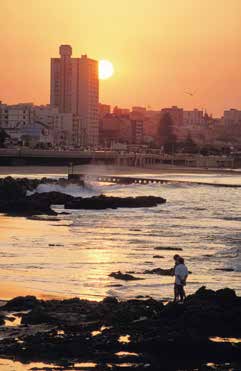 World Tourism Day gives cause to reflect on the myriad benefits that global tourism brings to communities, economies and, indeed, to world tourists themselves. Tourism Month in South Africa serves the same purpose, inviting the nation to be tourists in their own country, and to reflect on the economic value of tourism in South Africa.
World Tourism Day gives cause to reflect on the myriad benefits that global tourism brings to communities, economies and, indeed, to world tourists themselves. Tourism Month in South Africa serves the same purpose, inviting the nation to be tourists in their own country, and to reflect on the economic value of tourism in South Africa.
Tourism Month is a critical component of the larger domestic tourism campaign that works 365 days a year to grow a culture of tourism in South Africa. There is heightened focus in September on strengthening consumer marketing; communication and partnerships with the travel trade; and industry stakeholder collaboration.
This year the theme of Tourism Month is “A Million New Experiences Await Are a Sho’t Left Away”. It’s a theme that encourages the emerging segment of the market to go out and take a leisure break away from home, appealing to the innate desire people have to be surprised and delighted by the fresh, the new and the novel. It’s also a theme that encourages those South Africans who already have a strong culture of holidaying to go out and experience South Africa.
 In 2014 there were around 28 million domestic trips over the 12-month period by some 12 million people. Between them, these travellers spent about R230 a day whilst away from home, amounting to close to R27 billion over the year and more than 113 million nights away from home between them.
In 2014 there were around 28 million domestic trips over the 12-month period by some 12 million people. Between them, these travellers spent about R230 a day whilst away from home, amounting to close to R27 billion over the year and more than 113 million nights away from home between them.
There is still much work required to embed a culture of domestic leisure travel among South Africans. As an organisation, South African Tourism is currently revising the marketing strategy for the South African market to bring it in line with the global Meet South Africa campaign that has seen a surge in positivity about our destination around the world.
 In mid-May 2015 Tourism Minister Derek Hanekom informed Parliament that a budget of R100 million would be ring-fenced in the present financial year to stimulate more domestic trips. Tourism growth, the Minister said, is not only about increasing the number of tourists, whether domestic or foreign. It’s about growth that is sustainable and brings marginalised people into the mainstream of the economy. Domestic tourism growth is critical to the future of the tourism sector in South Africa. The South African market plays a major role in sustaining the tourism sector. A significantly enhanced marketing programme will combine awareness of travel with exciting destinations and affordable product offerings.
In mid-May 2015 Tourism Minister Derek Hanekom informed Parliament that a budget of R100 million would be ring-fenced in the present financial year to stimulate more domestic trips. Tourism growth, the Minister said, is not only about increasing the number of tourists, whether domestic or foreign. It’s about growth that is sustainable and brings marginalised people into the mainstream of the economy. Domestic tourism growth is critical to the future of the tourism sector in South Africa. The South African market plays a major role in sustaining the tourism sector. A significantly enhanced marketing programme will combine awareness of travel with exciting destinations and affordable product offerings.
 Messages of how affordable a leisure trip in South Africa is will be a major component of the campaign for the South African market. Of those people who did not travel last year, a significant proportion – 41 per cent – said they stayed at home because travelling was too expensive.
Messages of how affordable a leisure trip in South Africa is will be a major component of the campaign for the South African market. Of those people who did not travel last year, a significant proportion – 41 per cent – said they stayed at home because travelling was too expensive.
To address this perception, South African Tourism is working with the tourism industry to craft and promote trips that are affordable, accessible and invite the nation to ‘Meet South Africa’.
Narrowing the gap between the global and domestic tourism marketing campaigns will give uniformity in messaging and the benefit of economies of scale. It will also help to turn South Africans into powerful destination brand influencers, putting their vocal patriotism into the larger global and South African marketing mix.
 This Tourism Month you can in the quest to get the nation travelling. Be welcoming to all tourists. Show them the warm hospitality that South Africans are world famous for, and give them the insider’s track on the best places to go in your town or city. And be a tourist in South Africa yourself this Tourism Month. Pack an overnight bag and hit the road. A million new experiences are a sho’t left away and you will be doing your bit in contributing to the economic growth of the country.
This Tourism Month you can in the quest to get the nation travelling. Be welcoming to all tourists. Show them the warm hospitality that South Africans are world famous for, and give them the insider’s track on the best places to go in your town or city. And be a tourist in South Africa yourself this Tourism Month. Pack an overnight bag and hit the road. A million new experiences are a sho’t left away and you will be doing your bit in contributing to the economic growth of the country.
*Thulani Nzima is the Chief Executive Officer of South African Tourism.
More support for eThekwini youth
More support for eThekwini youth JoyLife will no longer be the same for scores of young people in the eThekwini Municipality following the establishment of the Youth Development Office.
This is one of the municipality’s programmes aimed at ensuring that young people participate in the mainstream economy.
Speaking to Vuk’uzenzele newly appointed Youth Office Manager Mndeni Mkhize said the aim of the Youth Development Office is to help young people with issues ranging from finance, business administration and business proposals among other things. Mkhize said their approach is aimed at enhancing the control the youth have over their lives.
The Youth Development Office will help with skills development and encourage the development of a culture of entrepreneurship for young people in the area.
“The establishment of the office will at the same time help us to create our database for youth business owners. We didn’t know how many youth businesses are within our municipality and what services do they offer as the information was scattered. But through this office we will now be able to have our own young entrepreneurs’ database,” said Mkhize.
He added that the office would also help the municipality identify challenges young entrepreneurs face and work with them to find solutions.
“We are saying to them ‘this is where we’re going to challenge you and these are the channels whereby there are opportunities’,” he said.
Mkhize added that the office will not only focus on those who want to start businesses but will also cater for those who want to further their studies.
“The eThekwini Mayor James Nxumalo recently launched [the] Student Financial Aid Relief Fund which offers bursaries to pupils who come from disadvantaged backgrounds. Last year alone we managed to help 200 students and hope to double the number this year,” he said.
Mkhize urged young people to come up with ideas that will help to transform their lives.
For more information on the eThekwini Youth Development office call contact: 031 3112070 or email: mndeni.mkhize@durban.gov.za
Human trafficking: What you need to know
Human trafficking: What you need to know JoyHuman traffickers exploit vulnerable men, women and children who are desperate to find a way out of poverty and live a better a life. It’s this desperation and a lack of education that government seeks to address with the new Prevention and Combating of Trafficking in Persons Act 2013, (Act No. 7 of 2013), which came into effect on 9 August.
 The Act will ensure that more cases of human trafficking are identified and successfully prosecuted. Since 2009, there have been 10 convictions in trafficking cases, mainly for the sexual exploitation of children.
The Act will ensure that more cases of human trafficking are identified and successfully prosecuted. Since 2009, there have been 10 convictions in trafficking cases, mainly for the sexual exploitation of children.
Human trafficking, defined as a modern-day form of slavery, sees people being removed from their homes, under false pretences or by force, and taken elsewhere – either in South Africa or to another country.
Some young girls are forced into marriage (ukuthwala) whilst other victims are destined for a life of prostitution, forced to work or even used for body parts.
The Act enables the state to prosecute human traffickers and confiscate their assets and a conviction could result in a life in prison or a severe fine, depending on the circumstances of the specific case.
Deputy Minister of Justice and Constitutional Development John Jeffery confirmed that the Act would help government deal with human traffickers decisively.
“Government made the scourge of trafficking its priority in the National Development Plan and measures have been put in place to ensure that the Act is implemented effectively.
“We have ensured extensive training of personnel at the National Prosecuting Authority (NPA) and South African Police Service (SAPS), social workers from the Department of Social Development, the Judiciary and officials from Immigration and Home Affairs,” he said.
A multi-agency programme, to coordinate strategic action against trafficking, has been established which will see the setting up of Provincial Task Teams that include all relevant stakeholders in the Criminal Justice System. In addition, a multi-disciplinary, interdepartmental Priority Committee has been established by the Justice Crime Prevention and Security Cluster Department.
Social service professionals will play a role in reporting, identifying and assessing victims of trafficking, so that they can be placed in an approved programme and reintegrated back into society. Children will be placed in temporary safe care and will fall under all the protective measures of the Children’s Act.
Be aware of human trafficking
Social Development Minister Bathabile Dlamini urged communities to be aware of human trafficking after an incident involving a 14 and 20-year-old who were taken from their grandmother in Mpumalanga to Malawi, under false pretences, by a woman who said she would take them to the United Kingdom (UK) to study.
The grandmother said that the 14-year-old has a learning difficulty and the woman promised to take the child to a specialist in UK.
They and four others were taken to Malawi, via Mozambique, as the human trafficker did not have the appropriate documentation needed to get them through the border in terms of the new immigration regulations which require all adults travelling with children to have the child’s unabridged birth certificate - a certificate from Home Affairs that shows the details of the child and the child’s parents.
Following an investigation, the children were contacted telephonically and confirmed that they were being abused physically and had to do heavy-duty household chores. They were rescued by the Department of Social Development’s International Social Services and Interpol.
“This case highlights the need for society to be vigilant about human trafficking, especially those communities situated in regions where South Africa shares borders with other countries.
“A trafficker takes advantage of their victim, who is often misinformed or tricked into leaving their home,” she explained.
Minister Dlamini intervened to ensure the safe return of these two South Africans, who were subjected to extensive child labour while in Malawi.
According to the United Nation’s 2014 Global Report on Trafficking in Persons, in Africa and the Middle East - between 2010 and 2012 - sexual exploitation accounted for 53 per cent of trafficking victims, while 37 per cent were subjected to forced labour, servitude and modern-day slavery.
Patric Solomons, the Director of Cape Town-based non-profit children’s rights group Molo Songololo, said children in poor and desperate communities are usually targets for recruiters and traffickers and urged parents to maintain open and honest communication with their children.
“Parents must acknowledge that children are sexual – it is natural and it can’t be avoided. We need to ensure that they are occupied with positive, age-appropriate friends and activities and hang out at appropriate places,” he said.
He stressed that parents should monitor their children’s behaviour, meet their friends and take down and verify contact details.
“Children need to know that you support them and that they can come to you for help.”
Prevent trafficking
There are a number of ways that people can protect themselves and prevent trafficking.
- The Department of Labour can help to validate job offers, particularly those outside your province or in another country.
- Be aware of people who promise job opportunities that offer a lot of money in a short space of time.
- Learn to recognise trafficked people. They are often unable to speak the local language, appear to be trapped in their job or place they stay, may have bruises or other signs of physical abuse and do not have identification documents.
- It’s also very important to teach your children to be aware of adults who try to befriend them, whether in person, through cell phone messages or via Internet chat rooms.
To report any suspicious behaviour call the Crime Stop Contact Centre on: 08600 10 111 or the National Prosecuting Authority at 012 845 6000.
Keep your family and home safe
Keep your family and home safe JoyWith an increase in the number of children being kidnapped by domestic workers or nannies in South Africa, it’s important for parents to be aware and careful of who they employ to help take care their children and homes.
There is a wide range of domestic workers/nannies to choose from and it is important that you pick the right person that will not put your children or family at risk.
Vuk’uzenzele bring you tips on how to keep your family safe and ensure that you employ the right person.
Security tips for parents, care-givers and parents-to-be
- Always recruit your staff through a reputable agency with traceable telephone numbers.
- References are very important. Make sure you ask for references and check them.
- If a person is recommended to you by a relative or a friend, ensure that you know where the person lives.
- Always insist on ID copies and passport copies where applicable.
- Never make any cash payments.
- Don’t employ someone off the streets. Even if friends and family recommend that person, you still have to interview that person.
- If you hire someone through an agency, ensure that the candidate referred to you has gone through the selection process and has been checked by the agency.
- For your own peace of mind and for the safety of your children, make the time to meet in person with the potential candidate before hiring them.
- If you have found a potential candidate go with the person to your nearest police station to get a security clearance before they start working for you.
- Always trust your gut instinct when making your choice.
Source: nannymaids.co.za
New ambulances for KZN
New ambulances for KZN JoyCommunities in KwaZulu-Natal (KZN) will soon experience faster and more effective emergency medical services. The KZN Department of Health has over 63 brand new ambulances to improve the quality of service it offers to citizens.
 Speaking at the handover ceremony in Durban, Health MEC Dr Sibongiseni Dhlomo revealed the 63 Mercedes Vito 116 CDI high-roof ambulances cost the department R35.5 million. The ambulances have been fitted with equipment that cost R5.8 million.
Speaking at the handover ceremony in Durban, Health MEC Dr Sibongiseni Dhlomo revealed the 63 Mercedes Vito 116 CDI high-roof ambulances cost the department R35.5 million. The ambulances have been fitted with equipment that cost R5.8 million.
MEC Dhlomo said the department always strives to have a sufficient number of ambulances to meet demand, hence the introduction of the new ambulances.
“We are a province that is home to more than 10 million people which amounts to 21 per cent of the population of the country and 80 per cent of these people depend on the public health sector for their medical and health needs.
“Our Emergency Medical Service (EMRS) is the largest emergency medical service in the country, operating more than 300 ambulances and having more than 2 500 paramedics in its employ,” explained MEC Dhlomo.
He said Emergency Services is one of the three core pillars of health service delivery alongside primary health care and hospital services. This component is crucial in attaining the core outcome of government which is to ensure a long and healthy life for all South Africans.
“Paramedics are usually [the] first healthcare professionals to arrive at the scene of an accident or homestead of a sick patient and quickly assess the situation and determine the proper course of action for that individual. We see investment in new ambulances as a means to enhance the working environment for the sector whose nature of work is characterised by emergency and urgency,” added MEC Dhlomo.
The new ambulances will top up and in most cases replace the current ambulances that the province has.
“In 2012 we replaced all operational ambulances with 386 new fully equipped ones. With wear and tear taking its toll, some of those have to be removed from operations due to repairs that are beyond economical usage. In that lot, we also lost 20 of them due to accidents,” said Nkatheko Sithole, the Provincial Head of EMRS.
The distribution of these new ambulances will be determined by the population size per district as well as the number of those that are operational. Amajuba district will get four, eThekwini district-eight, Harry Gwala district-five, Ilembe district -seven, Ugu district five, Mgungundlovu district six, Mkhanyakude district five, Mzinyathi district six, Thukela district five, Thungulu six and Zululand six.
MEC Dhlomo concluded his address by calling on communities to take care of the new ambulances.
“We make a strong appeal to our citizens to own and safeguard this property made available to assist those requiring emergency medical care.”
Cervical cancer: A silent killer
Cervical cancer: A silent killer JoyReynolda Makhutle only found out that she had cervical cancer when the disease had already advanced to stage three. If she had done a pap smear earlier in life, her fate could have been different.
A pap smear is a quick, painless test used to detect early cell changes in the neck of the womb, which may later become cancerous.
Cancer does not develop suddenly in the cells. There is a gradual change from normal, through various levels of abnormality to pre-cancer and eventually cancer. This process can take many years.
A pap smear detects these changes. Treatment can be given at an early stage to prevent the later development of cancer.
Finding out about cancer
Makhutle (58), who lives in Kagiso in Gauteng, had to have her womb removed after doctors found three tumours in her ovaries.
All her life Makhutle, who is also known as “Mama Ray” in her community, experienced severe abdominal pains and a heavy flow during menstruation.
“During my teenage years when I was menstruating I could not go to school because my period was very painful and my menstrual flow was very heavy.”
She had never been to a gynaecologist, but had been seeing a family doctor for 10 years. A pap smear was never suggested.
“When I turned 40 in 1998, I decided to get a second opinion from another doctor who suggested that I do a pap smear.
“The words pap smear were new to me but the doctor explained that the procedure would be quick and painless.”
“When my results came back I was
afraid because I did not know what to expect.
I was told that I have cervical cancer and that it was very aggressive and in stage three. I had to have surgery to remove part of the cancer.”
At stage three, the cancer had spread to the lower third of the vagina or onto the pelvic wall, causing kidney problems.
She said luckily, when she contracted the disease, she already had two daughters.
Her battle with cancer lasted five years and she had to go through chemotherapy to fight the disease.
“The cancer advanced and I had to have a second operation to remove the whole womb because I had three tumours. This was the biggest operation and I sank into a depression. I also suffered a minor stroke.”
In her battle against the disease, depression and a stroke, she also had to deal with being stigmatised.
“In my culture there is a misconception that if a women removes her womb she is half a woman or she has lost her femininity. My late husband was influenced by his family and left me because in his eyes I was only half a woman.
“I was at my lowest. I had two daughters to support, medical bills were piling up and I had quit my job as a banker because of the disease. My faith was the only thing that kept me going.”
Makhutle eventually won her battle against cancer.
Today she works in cervical cancer advocacy and teaches the community about the dangers of the disease and the importance of doing a pap smear.
What the experts say
Oncologist Dr Carolyn Noel from Charlotte Magxeke Hospital in Johannesburg said the biggest problem that she comes across when treating her patients is late diagnosis.
“Patients don’t understand the importance of doing a pap smear. By the time they get treatment the cancer has usually already advanced to stage three.”
Dr Noel said some of the symptoms of cervical cancer include irregular vaginal bleeding, vaginal discharge with an unpleasant odour, pelvic or back pain, pain during intercourse and more.
“Patients diagnosed with cervical cancer have a misconception that it’s a death sentence but it’s not, the sooner the disease is detected the better the chance of curing it.”
“The survival rate when cervical cancer is detected early is 92 per cent, as opposed to a 50 per cent when it is already at stage three,” Dr Noel said.
She added when a pap smear’s results are abnormal it does not necessarily mean that a person has cancer. It means that precancerous lesions have been identified and they could develop into cancer over time.
“The timeframe for cancer to develop can be anything from five to 20 years. It does not develop overnight.”
Dr Noel also said that the common ages that she treats for cervical cancer are between 48 and 50. However, there is a growing number of young people in their late 20s and early 30s who are also receiving treatment for stage three cancer.
She said this could be related to the fact that some of the young patients are HIV positive.
“In some patients the cancer is related to HIV. It is extremely important for patients living with the virus to go for pap smears.”
She said cervical cancer was a sexually transmitted disease, which comes from the Human Papillomavirus (HPV).
According to Dr Noel women should always ensure that they use condoms and do not have multiple sexual partners.
She said a pap smear should be done in intervals of 10 years in your 20s, 30s and 40s, but if a woman is HIV positive she should have it done once a year.
She also advised parents on the importance of ensuring that young girls receive the HPV vaccine to protect them from the virus.
Makhutle stressed that cervical cancer is treatable and women should love themselves and look after themselves. “As a woman you are woman enough even if you lose your womb.”
Office of Family Advocate puts children first
Office of Family Advocate puts children first JoyThe many legal custody battles, disputes, and cases of mediation and child abduction that plague South Africa often result in children becoming victims.
 For decades the Office of the Family Advocate (OFA) has worked at creating access to justice for vulnerable children, who cannot protect themselves, free of charge.
For decades the Office of the Family Advocate (OFA) has worked at creating access to justice for vulnerable children, who cannot protect themselves, free of charge.
Led by Advocate Petunia Seabi-Mathope, the OFA is placed within the Department of Justice and Constitutional Development (DoJ&CD). It serves as an unbiased, family law specialist and advisor to the court in cases of legal disputes over custody and parental rights. It also drafts parenting plans, conducts child psychological evaluations together with social workers and mediates between families where the welfare of a child is at stake.
“Our main role is to protect and promote the best interests of children in South Africa.
“The very existence of our office shows the recognition by the South African Government that children are indeed a very important sector of our society and we signify the commitment of the protection of the rights of vulnerable children in terms of domestic law and international treaties South Africa has adhered to,” says Advocate Seabi-Mathope.
The OFA, which celebrates its 25th anniversary this year, initially had limited jurisdiction and its offices were only situated in certain geographically areas.
With the introduction of the Children’s Act, 2005 (Act No 38 of 2005), the OFA’s services were made available to every child in the country, including children caught up in maintenance and domestic violence disputes.
“We started with only six family advocate offices, and today we have over 25 offices and 90 family advocates countrywide, and we also handle non-litigation cases by offering our mediation services,” said Adv Seabi-Mathope.
Non-litigation is when a case is discussed and processed out of a courtroom, and also includes testimony given by the child. In many ways this helps reduce the backlog of court cases.
To further help families the OFA has made its offices family- and child-friendly to make children and families feel safe and comfortable, thus enabling the OFA to do its work effectively.
An example of a child-friendly method the OFA introduced is the Child Tool Kit. Before the use of the kit social workers would ask a child important questions about his or her background and lifestyle, information that is vital to any legal case, however it was challenging to get children to open up to a stranger about intimate and emotional matters.
The development of the kit, which consists of colouring books, crayons, family- and friendly-figures, among others, gives the child tools with which to answer a social worker’s questions without feeling threatened.
“Its findings have been remarkable and really adds essence to a case,” says Adv Seabi-Mathope.
The Department of Justice and Constitutional Development encourages communities to make use of the Office.
Regional Family Advocate Offices contact details:
Chief Family Advocate:
Adv Petunia Seabi-Mathope
Tel: 012-357 8022, E-mail: NationalOffice-FA@justice.gov.za,
Physical Address: 329 Pretorius Street, Momentum Building, West Tower, Pretoria.
Bloemfontein, Free State:
Adv. L.M. Sangqu
Tel: 051-447 1115, E-mail: Bloemfontein-FA@justice.gov.za,
Physical Address: 163 A Nelson Mandela Drive, 2nd Floor Sanlam Building, Bloemfontein
Cape Town, Western Cape:
Adv. S. Ebrahim
Tel: 021-426 1216, E-mail: CapeTown-FA@justice.gov.za,
Physical Address: 55 Union Castle Building, 10th Floor, c/o House Street & St George’s Mall, Cape Town
Durban, KwaZulu-Natal:
Adv M. C. O’Gorman
Tel: 031-310 6500, E-mail: Mogorman@justice.gov.za,
Physical Address: 143 Margaret Mncadi Ave, 15th Floor Maritime House, Durban
East London, Buffalo City, Eastern Cape:
Adv K Gounden
Tel: 043- 722 8866/7, E-mail: EastLondon-FA@justice.gov.za,
Physical Address: 29 St Peters Road , Southernwood, East London
Johannesburg, Gauteng:
Adv. N. Thokoane
Tel: 011-333 3724, E-mail: Johannesburg-FA@justice.gov.za,
Physical Address: 94 Pritchard Street, 13th Floor, Schreiner Chambers, Johannesburg Kimberley, Northern Cape:
Kimberley
Adv. P.M Molokwane
Tel: 053-833 1019/63, E-mail: Kimberly-FA@justice.gov.za,
Physical Address: 5th Floor, New Public Building (Magistrate Court), c/o Knight & Stead Street,
Mafikeng, Mmabatho, North West:
Adv. B.Makganyoha
Tel: 018- 388 9500, E-mail: Mafikeng-FA@justice.gov.za,
Physical Address: 461/805 Steve Biko Drive, Unit 2, Mmabatho, 2745
Nelspruit, Mpumalanga:
Adv. B. Mkhize
Tel: 013 - 752 2755, E-mail: Nelspruit-FA@justice.gov.za,
Physical Address: No 3 Marloth Street, Nelspruit
Polokwane, Limpopo:
Adv. M.E. Khesa
Tel: 015 291 1730, E-mail: Polokwane-FA@justice.gov.
za, Physical Address: Wyndom Park Building, 23 Rabie Str, Polokwane
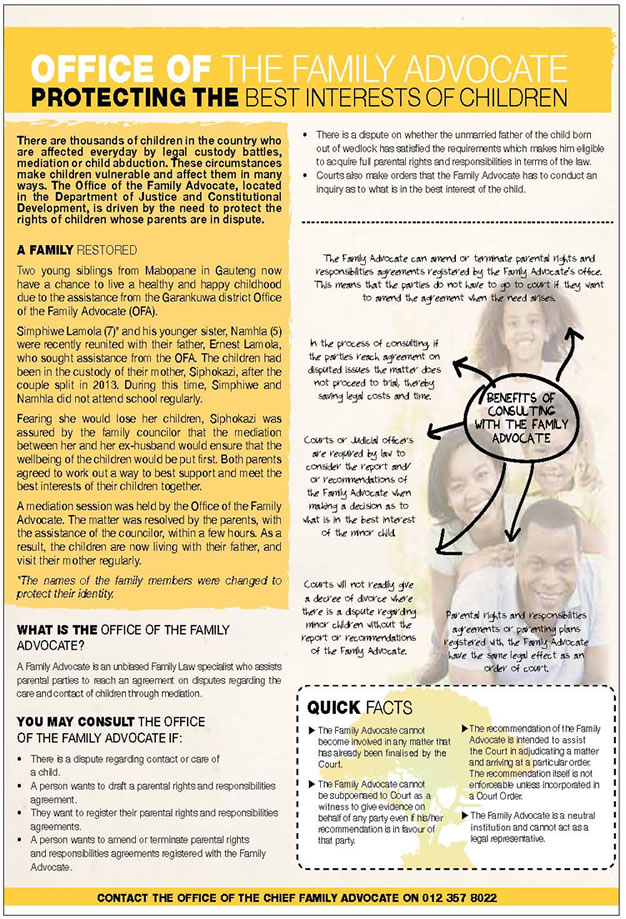
Cash injection for SA small claims courts
Cash injection for SA small claims courts JoySmall Claims Courts around the country are set to improve thanks to an agreement between the South African Government and the Swiss Confederation.
The agreement, which commenced in 2007, is being implemented in two phases. In total R4,5 million was contributed for the first phase, which ran until 2011 and focused on improving the functioning and efficiency of Small Claims Courts.
Phase two ran from March 2011 to 28 February 2015, with a further contribution of R10 million.
Towards the end of the second phase, the Swiss Confederation offered to extend the agreement by ten months, ending in December 2015, with an additional contribution of R3 million.
Since the start of the project 331 Small Claims Courts have been established, mostly in previously disadvantaged communities, rural towns and townships.
Further, programme guidelines for Small Claims Court clerks and commissioners were printed and distributed and are now being revised and updated, along with the training of 270 clerks and 487 commissioners.
Commissioners who preside in these courts are chosen from a pool of experienced legal professionals and academics who provide their services free of charge.
When the Minister of Justice and Constitutional Development Michael Masutha delivered his Budget Vote recently, he said Small Claims Courts were an important vehicle for people to access justice speedily and at no cost.
“The number of Small Claims Courts increased from 68 in 2009 to 340 in 2014/2015. We are very close to achieving our target of 384, one per magisterial district,” he said.
Small Claims Courts are used to settle minor civil disputes and claims between parties without representation by an attorney in an informal manner.
An amount not exceeding R15 000 can be claimed at the Small Claims Court. Before 2010, Small Claims Courts could only deal with cases involving small civil claims of R7 000 and below.
The jurisdiction of these courts was further increased to R15 000 as from April 2014.
Anybody can use the services of the Small Claims Court free of charge, all one has to pay is the Sheriff’s fee.
The department aims to have such courts in every magisterial district around the country.
For more information you can contact:
Ms Funeka Thema on: 012-357 8236 or Ms BS Sithole on: 012-357 8258 or send a fax to: 086 500 5549
16th Floor, East Tower Momentum Building, Pretoria
To find the nearest SCC to you, visit www.justice.gov.za/scc/scc_courts.htm
High hopes for new Brics Bank
High hopes for new Brics Bank JoyInternational relations
Brazil, Russia, India, China and South Africa (Brics) – also known as the Brics group of emerging economies have together launched the New Development Bank (NDB) in Shanghai.
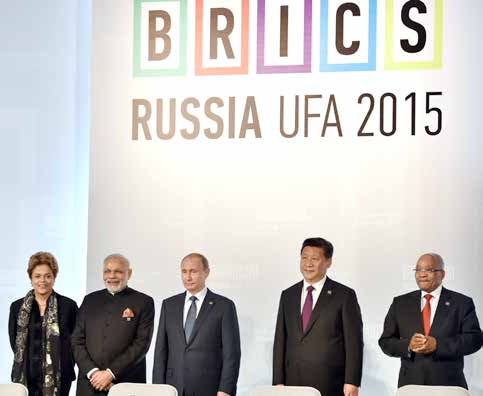 This is on the back of the 7th Brics Summit held in Ufa, Russia in July.
This is on the back of the 7th Brics Summit held in Ufa, Russia in July.
The NDB, which is situated in Shanghai, China, will lend money to developing countries to help finance infrastructure projects.
The first loan is expected to be made early next year by the bank, which will have $50 billion in starting capital and focus mainly on infrastructure projects.
The Brics Business Council will work closely with Brics governments to recommend specific lines for financing private projects on sustainable development, infrastructure, skills development and renewable energy.
Among its other recommendations, the council said the bank should finance early stage feasibility and engineering studies for the development of infrastructure projects that foster regional development. It has suggested that the bank focus on existing regional physical integration projects such as the Programme for Infrastructure Development in Africa (Pida).
To advance co-operative learning and help the bank to build investment processes, the council also wants the bank to carry out pilot projects in key pre-identified sectors such as energy and higher education.
It also recommended that the bank carry out a benchmarking exercise of national development banks in order to tailor proposal of fees, rates and terms of loans.
Russian President Putin told the summit that Russia would by the end of the year put together a blueprint mapping out investment co-operation between the Brics nations, adding that the government had already placed about 50 projects and business initiatives onto the roadmap
Among the proposals is one to establish an energy association and an energy research centre.
South Africa’s vice-president at the bank, Leslie Maasdorp, said in Shanghai during the bank’s launch that a lot of people were already pressing him for details of the bank’s first loans, but that the bank only expects to release these in the first quarter of next year.
Meanwhile, the bank’s next centre will be a regional one, to be launched in South Africa.
The Minister of International Relations Maite Nkoana-Mashabane said in July, that a temporary location for the regional office has been identified in Johannesburg.
She said as one of the main challenges to infrastructure development is the absence of bankable projects, project preparation will be the main focus of the centre.
The bank will have a president (India’s Kundapur Vaman Kamath) and four vice-presidents each chosen from one of the Brics countries. They will be based in Shanghai.
Maasdorp, the former vice-chairman of Barclays Capital and Absa Capital will represent South Africa as vice-president, while former Reserve Bank governor Tito was among the non-executive directors appointed.
Did you know?
- Together, Brics countries account for 43 per cent of the world’s population, almost 30 per cent of the world’s economy and produce a third of the world’s industrial products and half of all agricultural goods.
- Trade between member countries had increased from $168 billion (R2.1 trillion) in 2008 to $291 billion (R3.6 trillion) in 2014.
- South Africa’s trade with Brics has grown 43 per cent between 2011, when it was R268 billion and last year, when it hit R382 billion, said President Jacob Zuma during the summit.
- South Africa’s exports to Brics countries in 2013 accounted for 17 per cent of the country’s total exports, up from 13 per cent of all exports in 2010.
Africa can become a leader of innovation
Africa can become a leader of innovation JoyInternational relations
Africa’s vulnerability to diseases such as Ebola, Malaria, Tuberculosis and HIV must be a wake-up call to the world to collaborate with the continent in resolving these problems, says Science and Technology Minister Naledi Pandor.
 The Minister was speaking in London at the opening of a conference on higher education and science innovation in Africa.
The Minister was speaking in London at the opening of a conference on higher education and science innovation in Africa.
The two-day event was attended by Ministers of Science and Technology from across the continent including Senegal, Ethiopia and Uganda. The event, which was held under theme: “Africa’s scientific independence: No more business as usual” brought together over 200 people as part of the Planet Earth Institutes #ScienceAfrica campaign for an interactive event to explore the linkages between industry and scientific development in Africa.
Minister Pandor said the continent’s disease burden should not cause it to become a subject of scrutiny by research teams outside Africa, but full participants in bringing about solutions.
“We agree that research is international and collaborative, but we want the international to mean from Africa, by Africa-based scientists too,” the Minister said.
She added that the developed world must cooperate with Africa to create purposeful partnerships with a well-crafted agenda of science-based initiatives, and public and development funding that adequately resources researchers and their institutions.
“The mandate for our research, development and innovation must be unequivocal - find solutions to our challenges and be innovative and responsive.
“This call for a science active Africa is a further removal of the bonds of colonisation. Africa must free itself from the belief that someone out there cares more about our problems than we do,” the Minister said.
One way to achieve this was to locate major research infrastructure in Africa; develop, attract and retain talent; establish regional cooperation in science and technology; address policy priorities such as public health and international partnerships should be co-owned and co-determined by all constituents.
The Minister added that a focus on inter-discipline studies, entrepreneurship and strong business partnerships would be essential for African universities to play their required role in building African knowledge-based economies.
South Africa’s eight wonders
South Africa’s eight wonders JoySport, arts and culture
South Africa is not only home to some of the world’s best scenic views, coastlines and wildlife but also boasts eight heritage sites as determined by the United Nations Educational, Scientific and Cultural Organisation’s (UNESCO) World Heritage Committee.
A heritage site is a place of cultural or natural significance that is recognised as being of outstanding international importance and deserving of special protection.
All South Africans should make time to visit one or all of the sites.
The eight heritage sites are:
iSimangaliso Wetland Park
iSimangaliso Wetland Park is South Africa’s first world heritage site, and is situated in KwaZulu-Natal’s central coast of Zululand. Previously known as Greater St Lucia Wetland Park, iSimangaliso Wetland Park is home to a range of species of plant and animal life. With its exceptional beauty, the park contains lake systems, interlinking ecosystems, most of South Africa’s remaining swamp forests, Africa’s largest estuarine system and coastal dunes. That would probably explain why its name would be translated to “miracle and wonder”.
Robben Island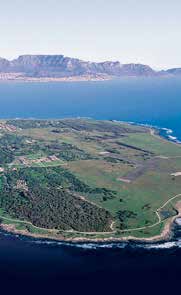
Robben Island has become a symbol of “the triumph of democracy and freedom over oppression”. The island is situated offshore from Cape Town and is also home to the Robben Island museum. Many political prisoners, including former president Neslon Mandela, were held on the island during apartheid. In 1999 the World Heritage Committee declared Robben Island a World Heritage site of cultural significance.

Cradle of Humankind
The Cradle of Humankind lies in Sterkfontein, Swartkrans, Kromdraai and surrounding areas. These regions have one of the world’s richest early human fossils or remains thereof. These fossils are as old as 3.5 million years old and these fossils and remains of ancient plants and animals, stretch over a distance of 47 000 hectares. The area provides important information on early humans who appeared 5 million years ago.
Maloti Drakensberg Park
The Maloti Drakensberg Park is known as a mixture of both cultural and natural significance. Culturally because of its rock paintings, and naturally because of its location in the Drakensberg mountains. The park is situated west of KwaZulu-Natal on the Lesotho border. For more than 4 000 years, the mountains have been home to South Africa’s indigenous people, the Khoisan. This would explain the rock paintings, “the largest collection in Africa”. These rock paintings are educational as they shed light on how the San people viewed the world they lived in.
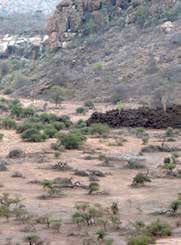
Mapungubwe Cultural Landscape
Mapungubwe, situated in Limpopo, means “place of the stone of wisdom”. It was known as South Africa’s First kingdom where people of affluent status traded with Egypt, India and China. Mapungubwe is situated in the grasslands of the Mapungubwe National Park, which is at the joining of the Limpopo and Shashe Rivers in the Limpopo province. It borders, South Africa, Zimbabwe and Botswana, which would explain the reasons for it being a trading centre.
Cape Floral Region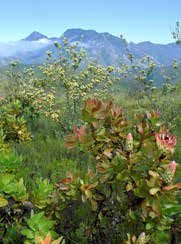
The Cape Floral Region contains 3 per cent of the world’s plant species. It consists of eight protected areas, surrounded by land and sea, stretching from the Cape Peninsula to the Eastern Cape. Kirstenbosch Botanical Garden, which is part of the region, became the first Botanical Gardens to be part of a world heritage site. The Cape Floral Region has a large number of diverse plant and animal species, ranking South Africa as third highest in biodiversity. This region is also home to many indigenous plants not known to any other place on earth. Although small in landmass, the region is home to 20 per cent of Africa’s plant life.

Vredefort Dome
Near the town of Vredefort in the Free State, some 2 billion years ago a meteorite hit the earth and created an enormous impact crater, today known as the Vredefort Dome. Although in the top three for crater structures, the Vredefot dome is the oldest and largest meteorite visible on the planet. The original crater must have been about 250-300 kilometres in diameter, but has eroded away over the years. The original impact of the meteorite was 380 kilometres across, which consists of three circles of uplifted rock. The inner circle was named a world heritage site and is visible over the range of hills near Parys and Vredefort.
Richtersveld Cultural Landscape
This landscape covers 160 000 hectares of rocky desert. A unique feature about this site is that it is owned and managed by a community, known as the Nama people. Although the temperatures in this area are very high, it provides a semi-nomadic pastoral livelihood for the Nama people. The Nama people are descendants of the Khoisan people. Due to the land restitution programme of South Africa the Nama people were given back their land a few years ago. Today the Nama people live in the land and conserve its natural surroundings. The Nama people are still nomadic to this day.
*Information obtained from the Department of Arts and Culture and SouthAfrica.info.
*Pictures obtained from SouthAfrica.info.
Promoting youth participation in sport
Promoting youth participation in sport JoySport, arts and culture
For many decades sport has been a unifier in South Africa because it has shown it has the power to heal old wounds.
Many remember when the Springboks won the Rugby World Cup on home turf in 1995 during the height of racial tensions in South Africa. But when former President Nelson Mandela donned the No 6 shirt of the team’s captain – Francois Pienaar, a white Afrikaner – the gesture sent an image of racial reconciliation which melted hearts around the country.
It is this power of sport that inspired the National Youth Development Agency (NYDA) to sponsor the first annual June 16 soccer tournament played in Johannesburg recently.
The agency’s spokesperson Siyabonga Magadla said there were a number of benefits associated with youth participating in sports.
“Sports has a way of promoting social cohesion and positive thinking and behaviour among young people. It promotes healthy lifestyle and well-being. If we are to continue supporting and promoting youth participation in sports, it will go a long way in ensuring that young are prevented in engaging in social ills like drugs and substance abuse,” Magadla said.
The NYDA said the youth of today face many challenges such as HIV and Aids, drug abuse and alcoholism.
While government continues to show its strongest hand in fighting youth challenges, young people are urged to see opportunities around them despite their challenges.
Magadla said: “We therefore have a responsibility as part of our youth development work to encourage youth participation in sports and education towards the development of young people.”
The inaugural June 16 Soccer Cup, aligned to the Youth Month activities, saw two schools chosen from Soweto and a team from the national the South African Broadcasting Corporation (SABC), battling it out in the field of play for a trophy, gold medals and prizes ranging from R3 000 to R6 000.
The event started with a motivational session during which renowned SABC soccer analyst and life coach Christopher Bongo motivated the young players to follow their dreams in life. He also encouraged the youngsters to stay in school so that after their playing days, they can be able to pursue various careers available in sports.
The event will take place in Tshwane next year to allow local schools a chance to participate.
Lavela High School from Dobsonville were crowned champions of the tournament after beating the SABC team.
For its effort, the team was awarded a trophy and R6 000 to be used towards sports improvement.
Teacher Dan Makgale said he was happy that his team won. “This will serve as motivation for the kids to work hard in their studies as they have seen that anything is possible if you work hard in it,” Makgale said.
The SABC team were runners up and walked away with R3 000 and silver medals, while the other school, Kwadeda Secondar,y got bronze medals and a R1 000 prize.
Apart from the money donated by the NYDA, Supersport donated a number of soccer balls that were used on the day.
